Colorado Documents
Quitclaim Deed
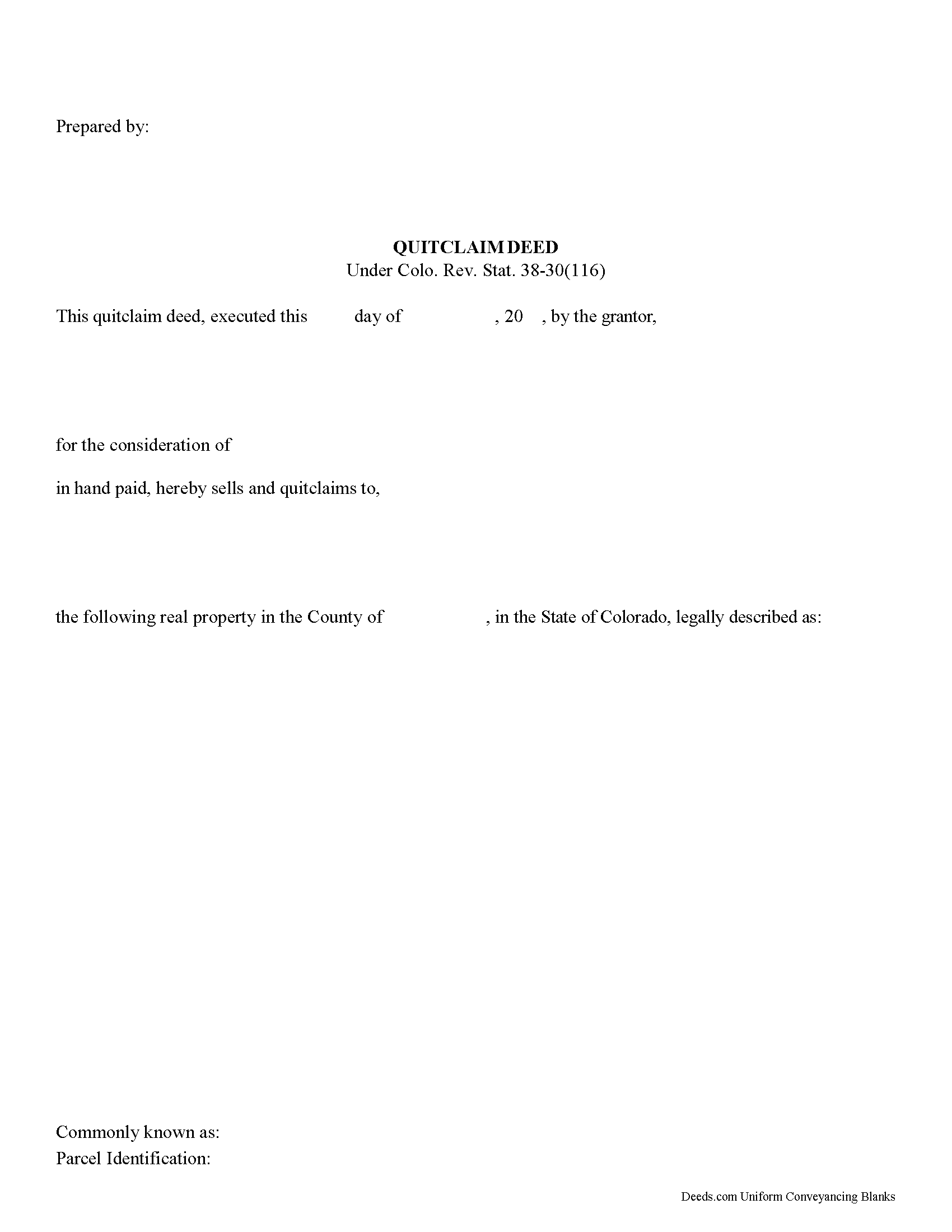
Properly executed quitclaim deed documents in the state of Colorado must conform to specific statutory requirements.
Content:
Valid quitclaim deeds require the name, address, and county of both the grantor and the grantee; the amount of consideration paid for the real property (usually money); a formal legal description and address for the parcel; the assessor's ID number if available; date of execution; and an acknowledged signature of the grantor. See C.R.S. 38-30-113, 114, 116; C.R.S. 38-35-122. In addition, the language in the statutory form should be modified so that "quitclaim" replaces "convey" and "warrant title to the same" is omitted.
Recording:
C.R.S. 38-35-109 governs recording quitclaim deeds in Colorado. After the deed is executed, record it in the office of the county clerk where the land is situated. This preserves the continuous chain of title and allows future prospective owners to review the property's ownership history. Colorado adheres to a "race-notice" recording statute. This means that if a transfer of real property ownership is signed and acknowledged but not entered into the public record by recording, and the original grantor reconveys the same pr... More Information about the Colorado Quitclaim Deed
Gift Deed
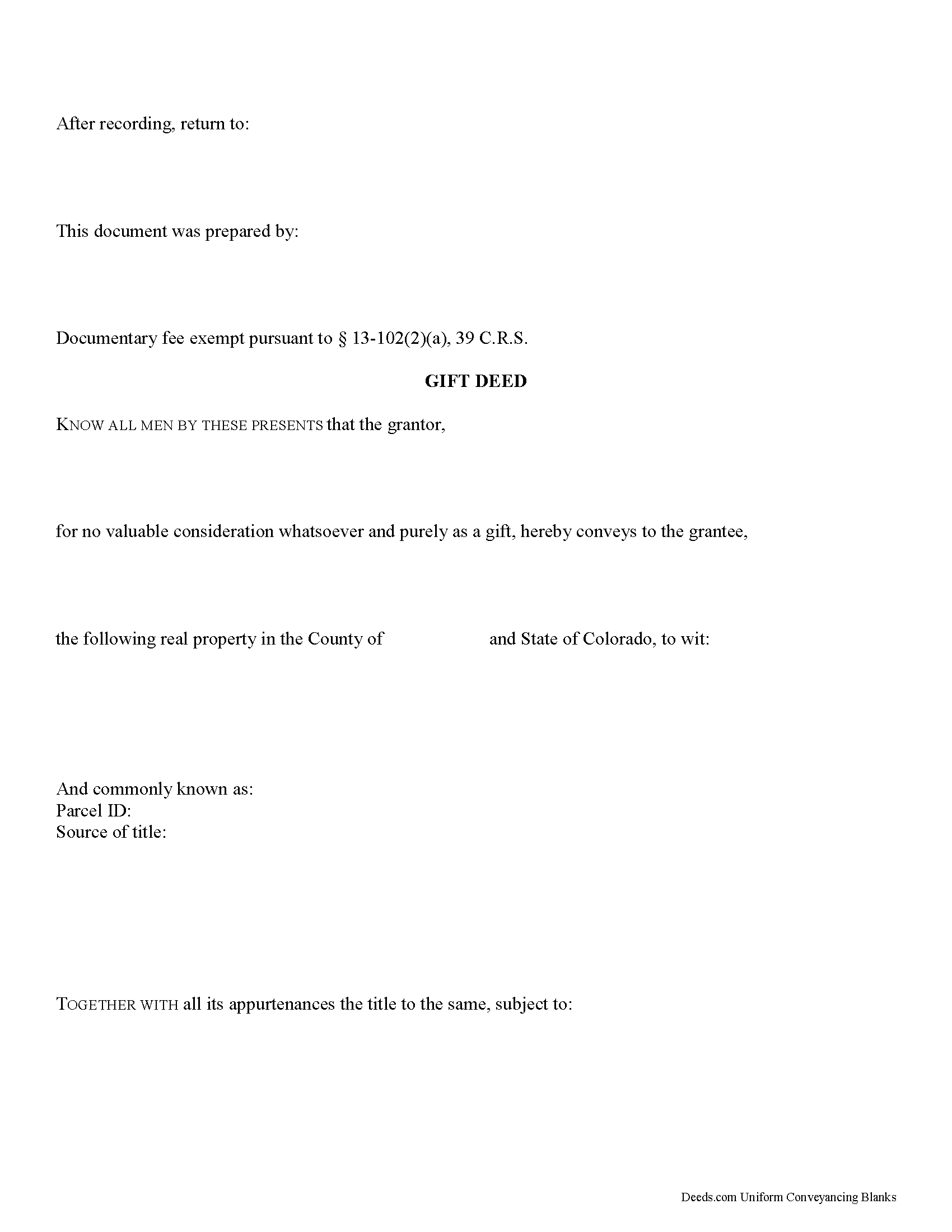
Gifts of Real Property in Colorado
Gift deeds convey title to real property from one party to another with no exchange of consideration, monetary or otherwise. Often used to transfer property between family members or to gift property as a charitable act or donation, these conveyances occur during the grantor's lifetime. Gift deeds must contain language that explicitly states that no consideration is expected or required. Ambiguous language, or references to any type of consideration, can make the gift deed contestable in court.
A lawful gift deed includes the grantor's full name and marital status, as well as the grantee's full name, marital status, vesting, and mailing address. Vesting describes how the grantee holds title to the property. Generally, real property is owned in either sole ownership or in co-ownership. For Colorado residential property, the primary methods for holding title in co-ownership are tenancy in common and joint tenancy. An estate conveyed to two or more persons vests as a tenancy in common unless otherwise specified ( 31-101, 38 C.R.S.). The primary characteristic of joint tenancy is the right of survivorship. In Colorado, when joint tenancy is decl... More Information about the Colorado Gift Deed
Warranty Deed
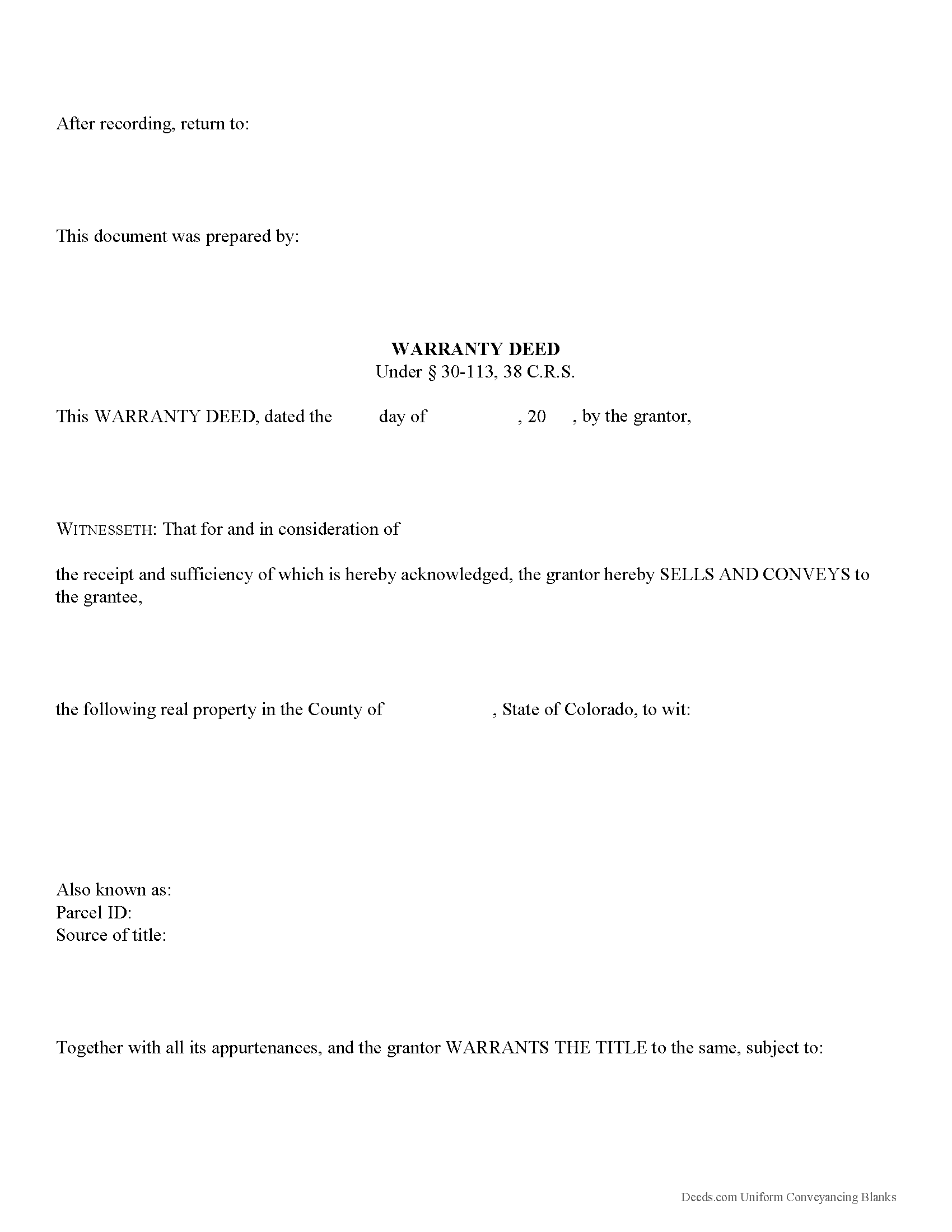
A warranty deed in Colorado can be used to facilitate a conveyance of real estate in fee simple. The Colorado Revised Statutes, section 38-30-113, provide a short form for a warranty deed with covenants on the part of the grantor. The use of the phrase "warrant the title" in a warranty deed implies the following covenants from the grantor to the grantee, his heirs, and assigns: (a) That at the time the instrument was made, the grantor was seized of an indefeasible estate in fee simple in and to the property described in the deed and has good right and full power to convey the same; (b) That the property was free from all encumbrances, except as may be stated in the instrument; and (c) That the grantor warrants to the grantee, his heirs, and assigns the quiet and peaceable possession of the property and will defend the title thereto against all persons who may lawfully claim the same (38-30-113).
A warranty deed must include the grantor's signature, which should also be acknowledged. If executed in Colorado, a warranty deed can be acknowledged or proved before any of the officers listed in 38-30-126. Section 38-30-126 also lists the officers authorized to perform acknowledgements... More Information about the Colorado Warranty Deed
Special Warranty Deed
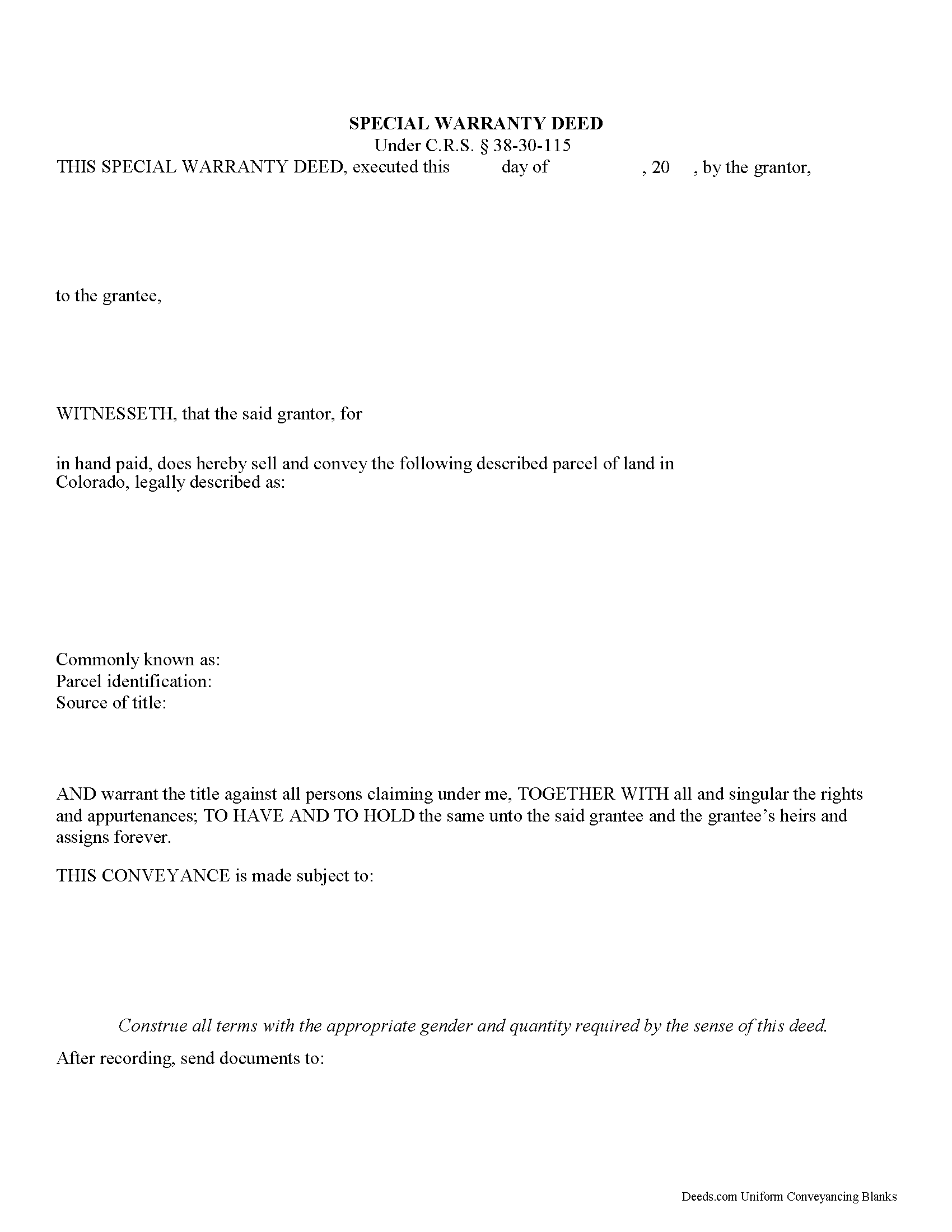
Duly executed and acknowledged special warranty deeds in Colorado can be used to convey title to real estate. The real estate deed must conform to the statutory requirements.
A special warranty deed that has been executed according to the Colorado statutory form for a warranty deed in 38-30-113 with the words "warrant the title to the same" omitted will have the same force and effect as a bargain and sale deed, without covenants of warranty. This type of deed will pass the after-acquired title of the grantor. The words "and warrant the title against all persons claiming under me," when included in such deed, will be a covenant that the grantor will warrant and defend the title to the grantee and his heirs and assigns against all persons claiming to hold title by, through, or under the grantor (38-30-115). A special warranty deed containing the words "and warrant the title to" will mean that the grantor covenants (a) that at the time such instrument was made, he was lawfully seized of an indefeasible estate in fee simple in and to the property described in the deed and has good right and full power to convey the same and (b) that the same was free and clear from all encumbrances... More Information about the Colorado Special Warranty Deed
Grant Deed
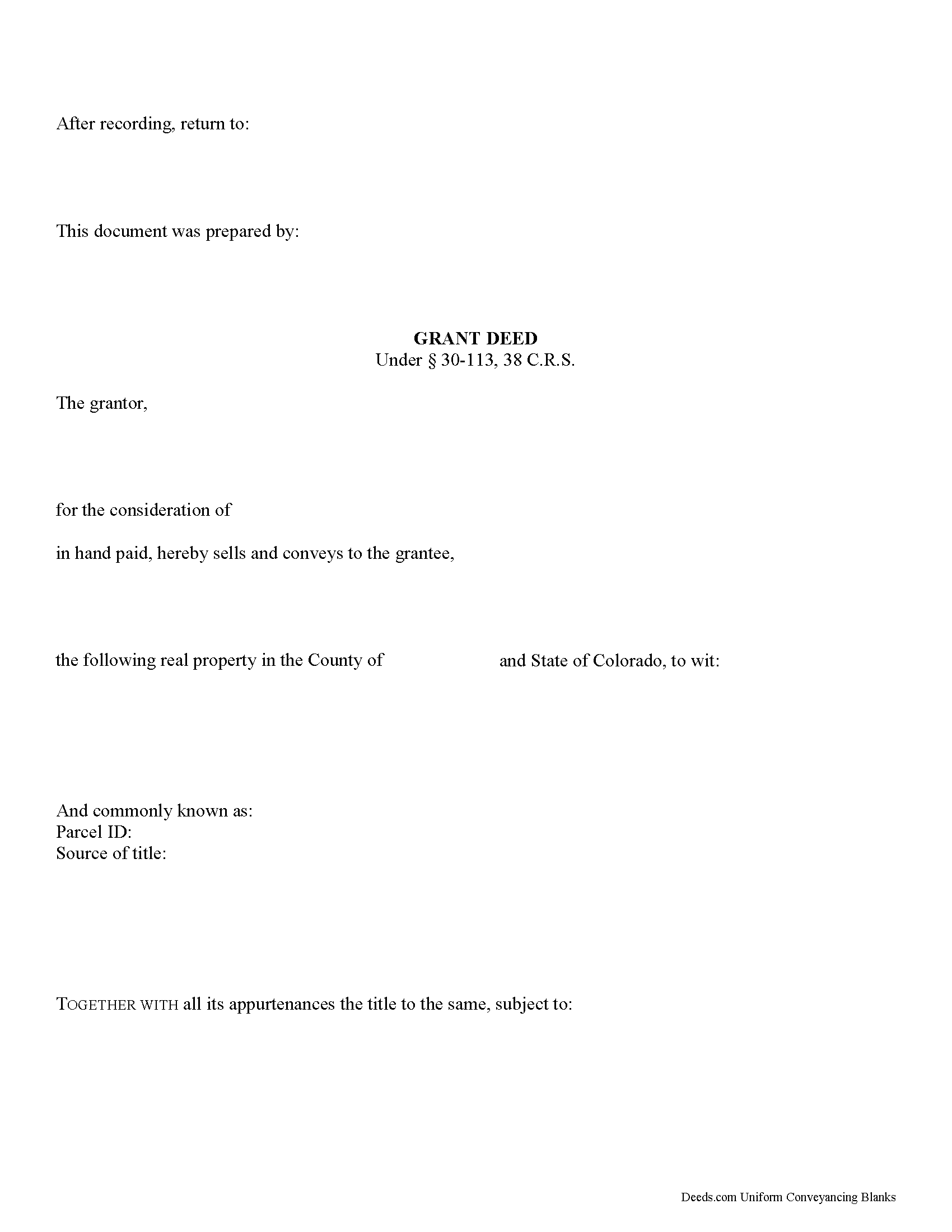
A deed is a legal document that transfers title to real property from one party to another. In Colorado, property owners can use a grant deed to transfer real estate.
When completed and filed properly, a grant deed is a conveyance in fee simple of the grantor's interest in the real property to the grantee (30-113, 38 C.R.S.). Any explicit covenants described in the document are binding upon the grantor and his/her heirs (30-113(3), 38 C.R.S.).
A lawful grant deed includes the grantor's full name, marital status, and address, the consideration given for the transfer, and the grantee's full name, marital status, vesting, and mailing address. Vesting describes how the grantee holds title to the property. Generally, real property is held in either sole ownership or in co-ownership. For Colorado residential property, the primary methods for holding title in co-ownership are tenancy in common and joint tenancy (31-101, 38 C.R.S.).
As with any conveyance of realty, a grant deed requires a complete legal description of the parcel. Recite the source of title in order to establish a clear chain of title, and detail any restrictions associated with the property. Each grantor must si... More Information about the Colorado Grant Deed
Correction Deed
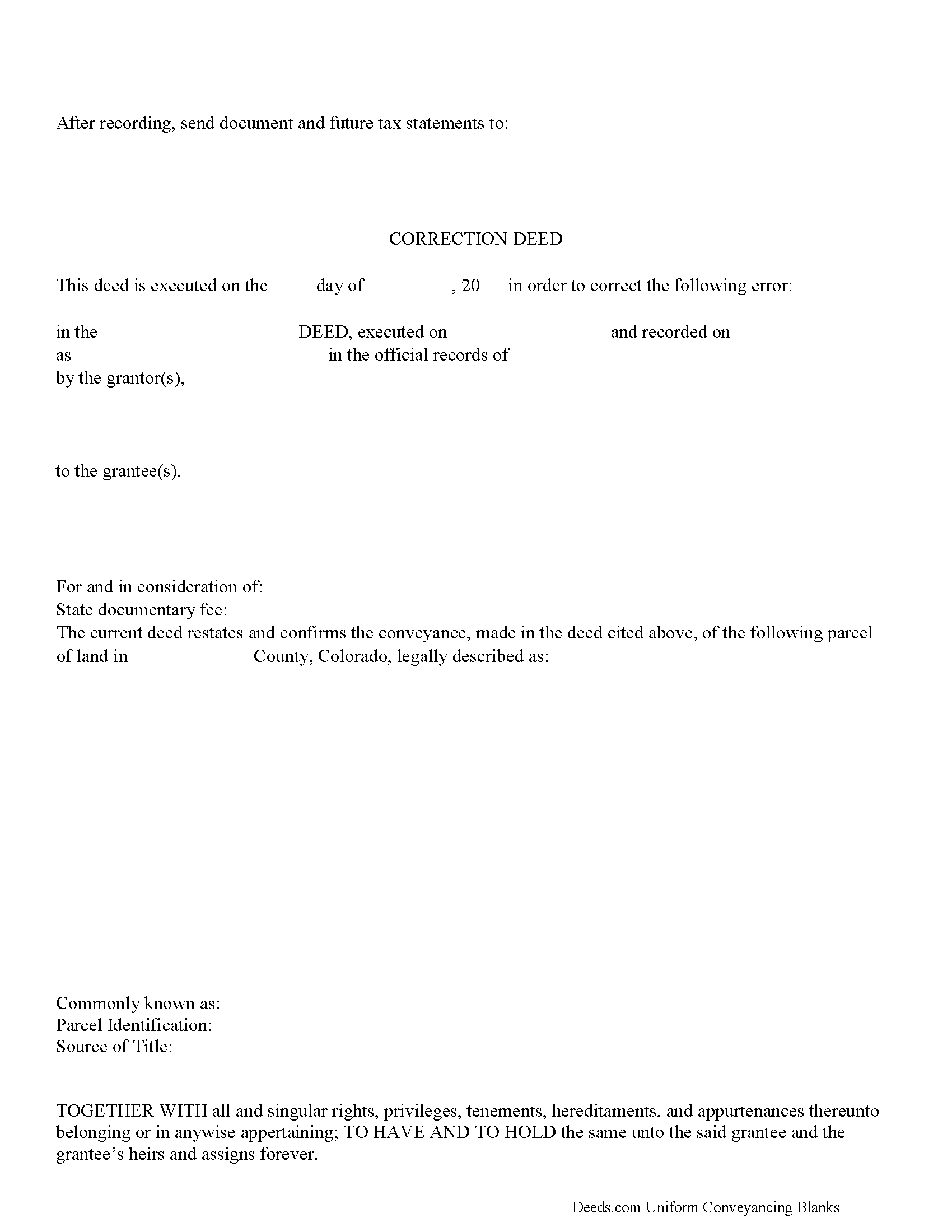
Use this deed form to make minor corrections in a previously recorded warranty, special warranty or quitclaim deed.
In Colorado, a previously recorded deed can be corrected by recording a second deed, called a correction or corrective deed. The sole purpose of such a document is to prevent potential title flaws, which may create problems when the current owner attempts to sell the property. The correction deed does not convey title but confirms the prior conveyance. For the most part it reiterates the prior deed verbatim, except for the corrected item and the consideration.
The errors usually adjusted by a corrective deed are minor omissions or typographical mistakes, sometimes called scrivener's errors. Among those are misspelled names, omitted or wrong middle initial, a minor error in the property description, or an omitted execution date, or a faulty acknowledgment. However, certain types of changes cannot be achieved by using a correction deed. For example: the addition or omission of a grantee; changing the manner in which title is held to/from "joint tenants with rights of survivorship"; making material changes to the legal description; or deleting a portion of the ori... More Information about the Colorado Correction Deed
Easement Deed
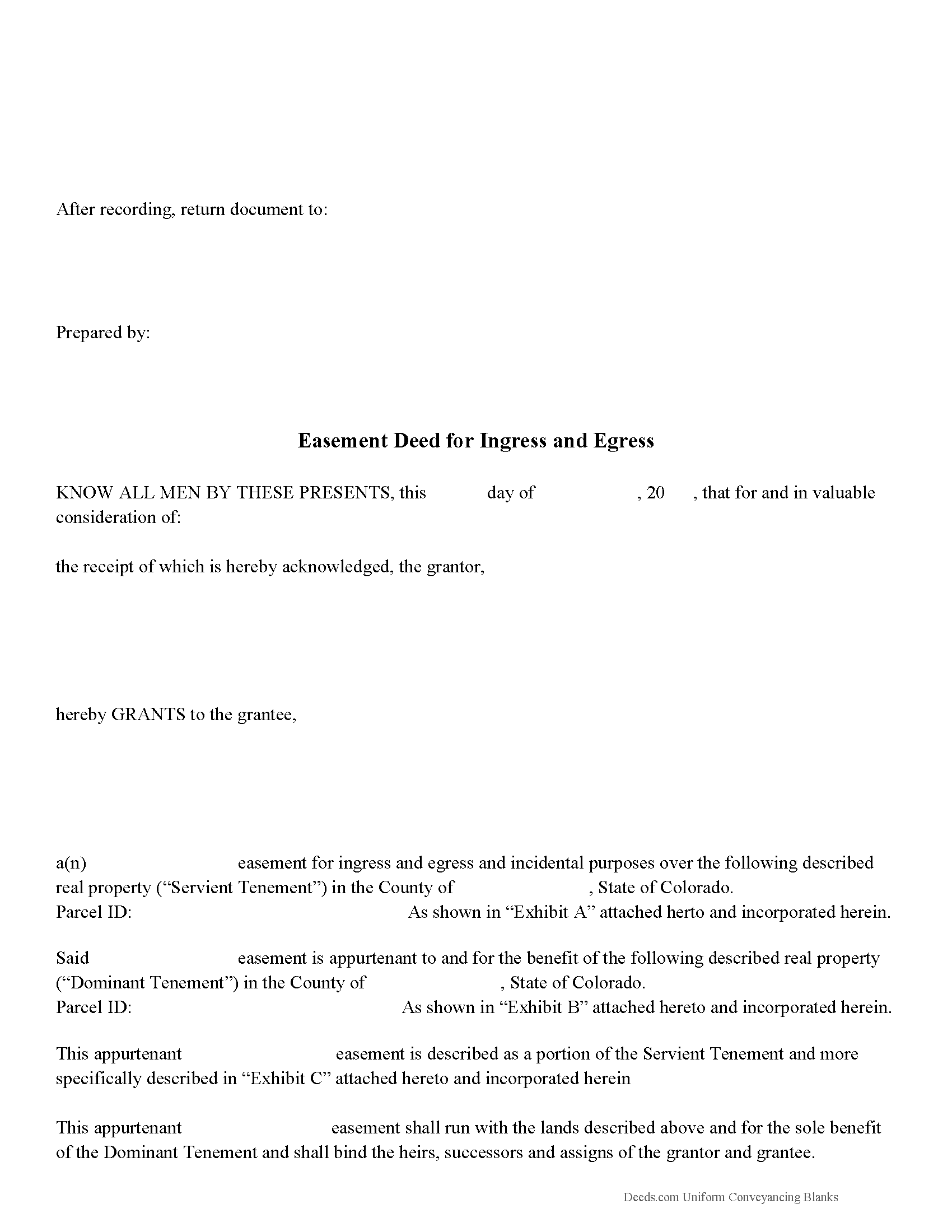
An easement is a right or agreement in writing to use all or part of the real property of another person for a specific purpose. It is considered to be an interest in real property, but is not an ownership or possessory interest. An owner of real property in Colorado may create an easement by a written document, which can be in the form of a deed, easement agreement, or other document including the language of a conveyance or grant. An easement must be classified as affirmative or negative. The deed or other instrument creating the easement must follow the normal rules that apply to a conveyance of land in Colorado.
Colorado also has a conservation easement, which is a legal agreement between a landowner and a qualified conservation organization or government agency that permanently limits a property's uses to protect its conservation values. Conservation easements can protect the land while still leaving it in private ownership (38-30.5-102). Solar easements can also be created in this state, and such a right can be stated in any deed, will, or other instrument executed by or on behalf of any owner of land or sky space (38-32.5-100.3). Both conservation easements and solar eas... More Information about the Colorado Easement Deed
Termination, Cancellation of Easement / Right of Way
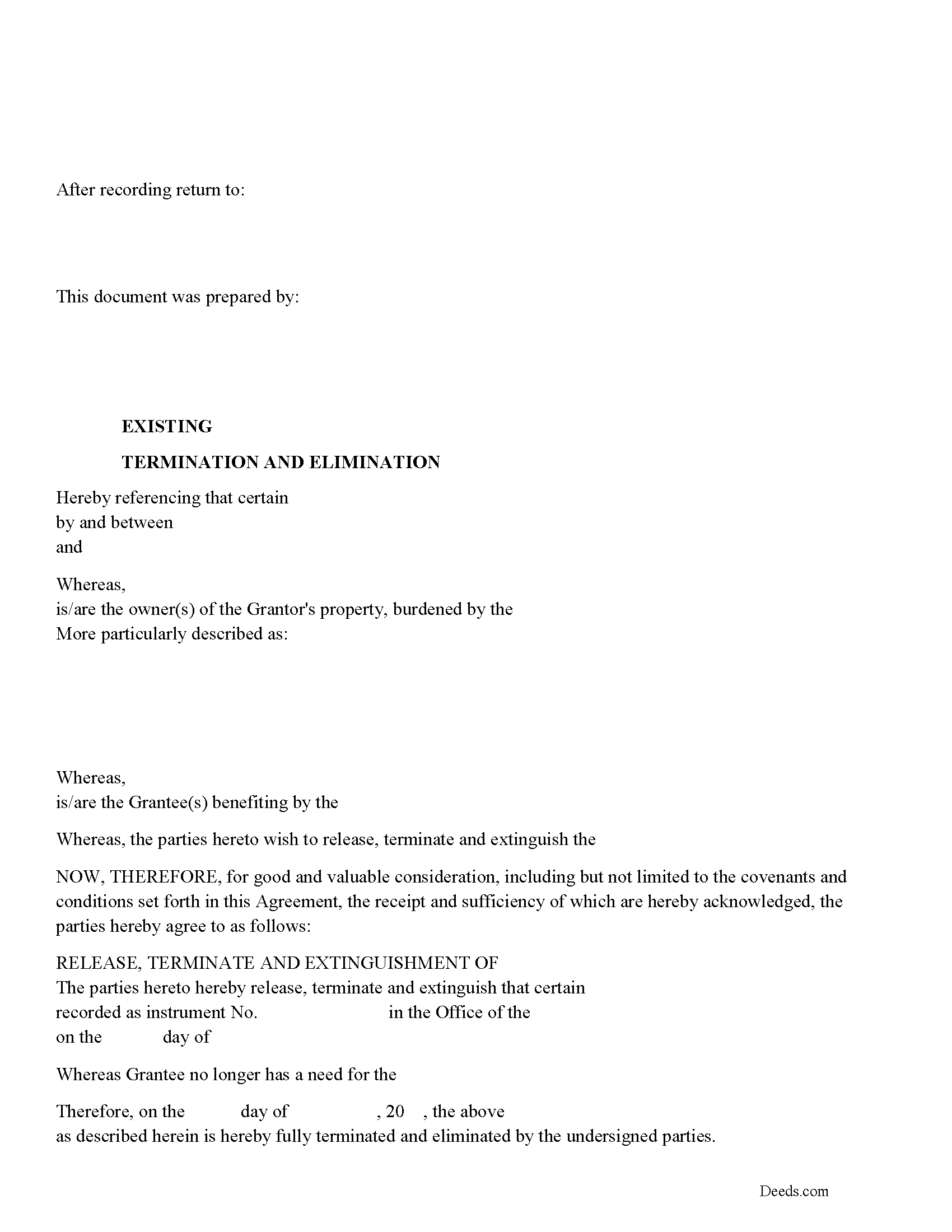
Use this form to release, terminate, extinguish a previously recorded document that involves access to and from a property.
Documents such as:
1. Easement Deeds or Agreements (An easement is a non-possessory interest in land, granting the right to use someone else's property for a specific purpose, like a driveway or utility line)
2. Access Roads
3. Right of Ways
4. Utility Easements (Power, Gas, Water, Sewer, Etc.)
5. Drainage Easements
This document allows the owner of the land, burdened by the access and the party that benefits from the access, to sign an agreement releasing the property from such access, ... More Information about the Colorado Termination, Cancellation of Easement / Right of Way
Deed of Trust and Promissory Note
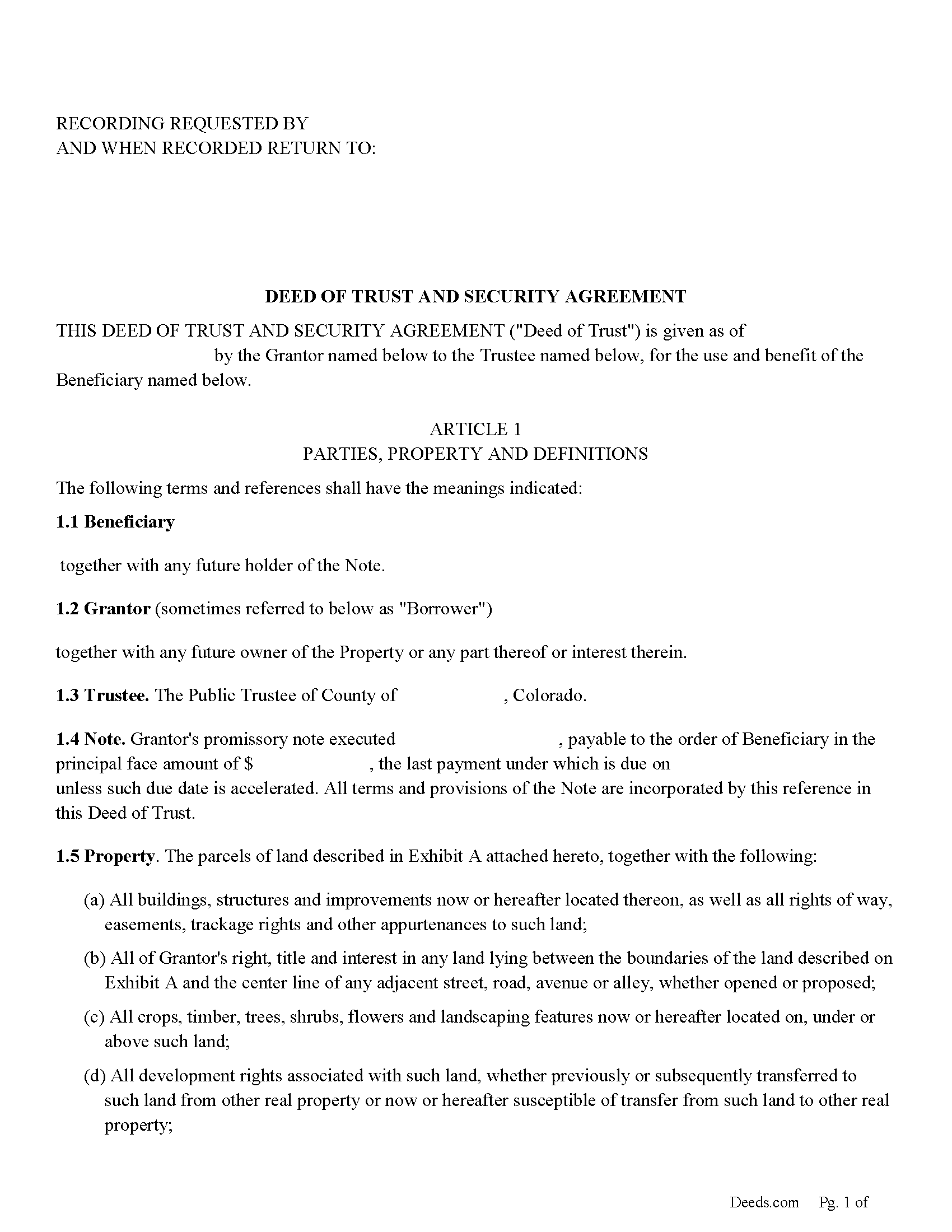
Deeds of Trust are the preferred method of securing debt on property in Colorado, if the Deed of Trust includes a proper power of sale clause the lender can pursue a public trustee foreclosure in the case of default. The borrower pre-authorizes the sale of property to pay off the balance on a loan in the event of the their default.
("Deed of trust" means a security instrument containing a grant to a public trustee together with a power of sale.) ( 38-38-100.3(7))
A promissory note is a promise to pay and includes things such as interest rates, default rates, late fees, penalties, etc. The Deed of Trust makes the promissory note a debt secured by a lien on the subject property. In Colorado a promissory note must include the loan amount, payment schedule and time frame. Both borrowers and lenders must sign.
For use in Colorado only on residential property, rental property, condominiums, vacant land, second homes and planned units.
(Colorado Deed of Trust Package includes forms, guidelines, and completed examples)
... More Information about the Colorado Deed of Trust and Promissory Note
Release of Deed of Trust WITH Production of Evidence
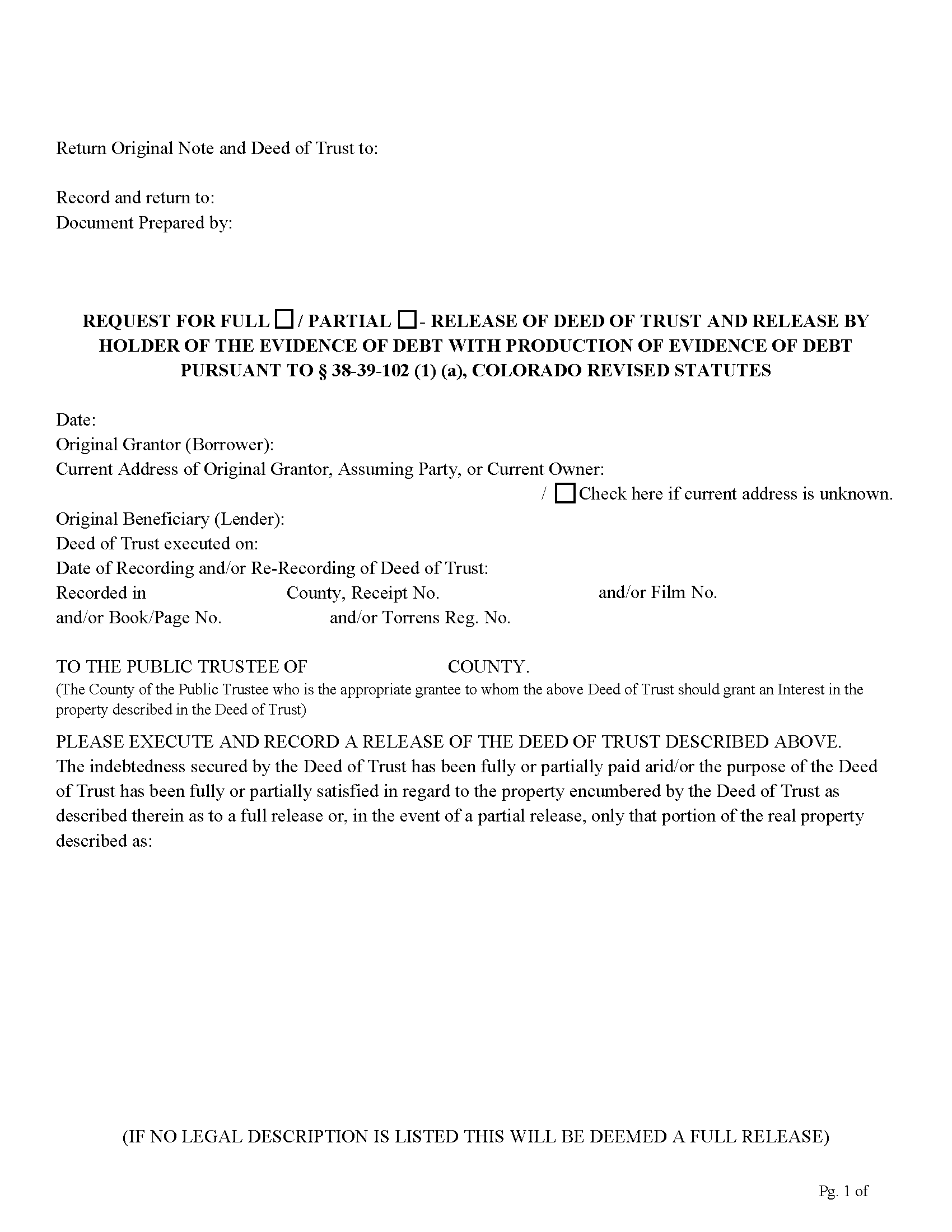
Use this form to Release a Deed of Trust (fully or partially) with an Original Promissory Note and Original Deed of Trust (If the Deed of Trust is lost, a copy showing all the recording information is acceptable.) Note: if you do NOT have an original Promissory Note then a Release WITHOUT Production of Evidence form must be used.
38-39-102
(1) (a) Except as otherwise provided in paragraph (a) of subsection (3) of this section, a deed of trust to the public trustee, upon compliance with the provisions of the deed of trust, shall be released by the public trustee upon the:
(I) Receipt of a written request from the holder of the evidence of debt secured by the deed of trust, the holder's agent or attorney, or a title insurance company providing an indemnification agreement and affidavit described in paragraph (c) of subsection (3) of this section, which request shall be duly executed and acknowledged;
(Colorado Release of DOT Package includes form, guidelines, and completed example) For use in Colorado only.
... More Information about the Colorado Release of Deed of Trust WITH Production of Evidence
Release of Deed of Trust WITHOUT Production of Evidence
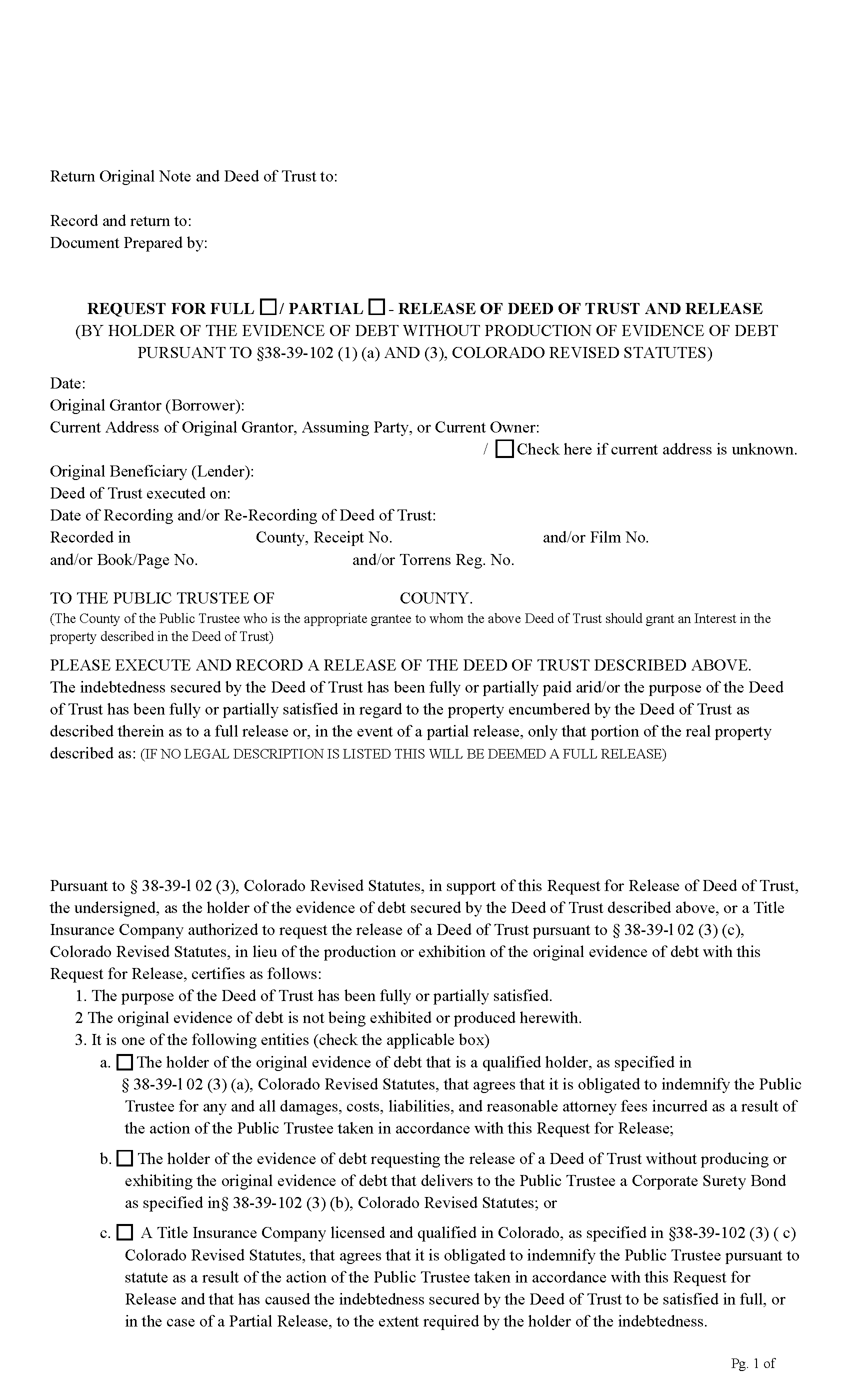
Use this form to Release a Deed of Trust (fully or partially) when the Original Promissory Note is lost or unavailable. The Promissory Note is the production of evidence.
Use this form when:
1. When the current holder of debt is a qualified holder in Colorado. ( 38-39-102. (II) A holder of the original evidence of debt that is a qualified holder, as defined in section 38-38-100.3 (20),
2. When the current holder of debt is NOT a qualified holder and is submitting an original Lost Instrument surety bond in place of the original Promissory Note.
3. When the entity executing and signing the Request for Release of Deed of Trust is a Colorado State Bank, a National Bank, a Colorado chartered Credit Union, Federally chartered Credit Union, or a Title Insurance Company licensed and qualified in Colorado, etc. rather than the current holder of debt.
38-39-102
(1) (a) Except as otherwise provided in paragraph (a) of subsection (3) of this section, a deed of trust to the public trustee, upon compliance with the provisions of the deed of trust, shall be released by the public trustee upon the:
(I) Receipt of a written request from the holder of the evidence of debt secured by the de... More Information about the Colorado Release of Deed of Trust WITHOUT Production of Evidence
Assignment of Deed of Trust
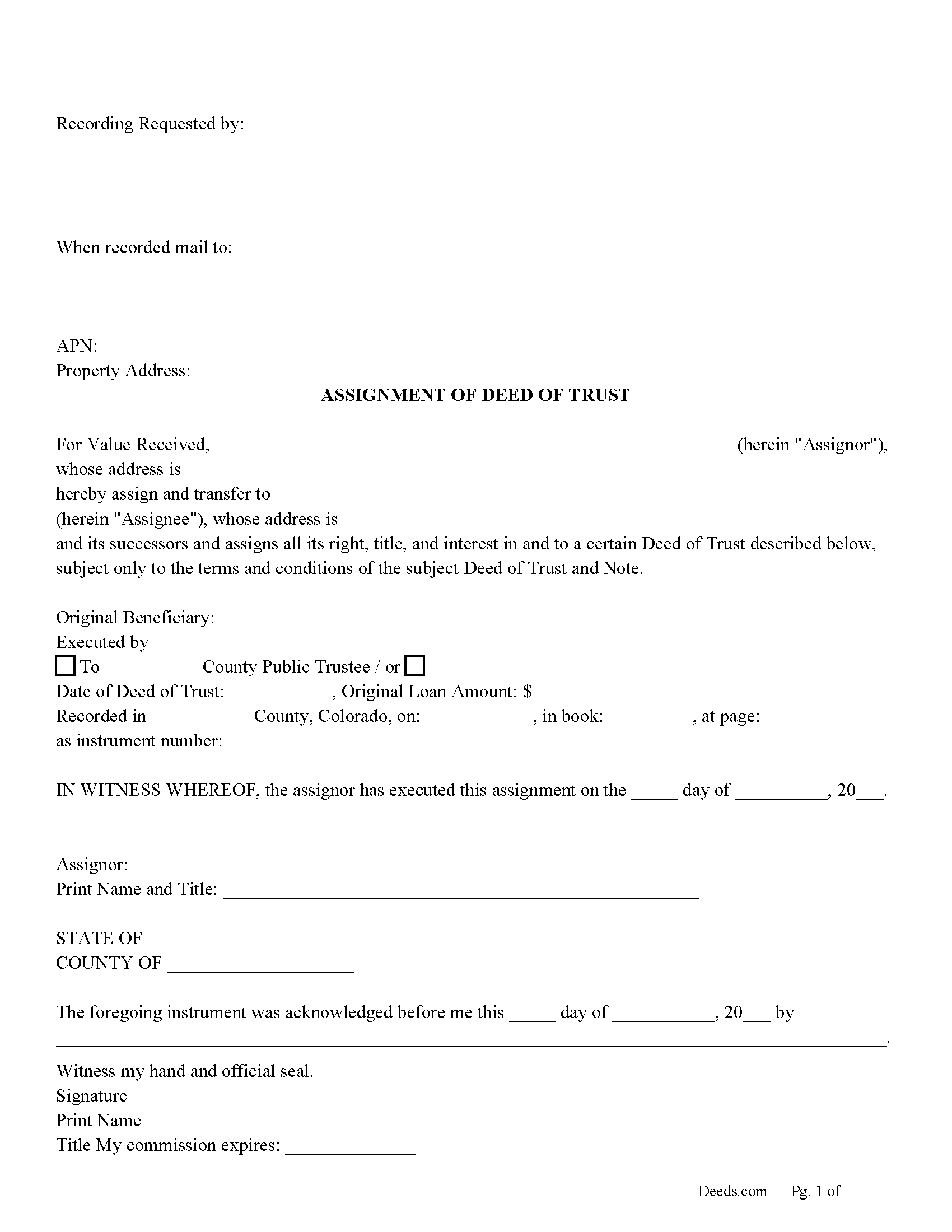
Use this form to assign a formerly recorded Deed of Trust to another entity. This form can be used with a public or conventional trustee. Public trustees are primarily used in Colorado, but conventional trustees are also used. [Any deed of trust that names any person other than a public trustee as trustee therein or that secures an obligation other than an evidence of debt shall be deemed and taken to be a mortgage for all purposes and foreclosed only as mortgages are foreclosed in and through the courts; except that any deed of trust that names a public trustee as trustee therein and secures an obligation other than an instrument evidencing a debt shall be released as provided in section 38-39-102 (5).] [38-39-101] / Note: Colorado is the only state at this time to have a Public Trustee System.
38-38-100.3. Definitions (10) "Holder of an evidence of debt" or "holder" means the person in actual possession of or person entitled to enforce an evidence of debt; except that the term does not include a person acting as a nominee solely for the purpose of holding the evidence of debt or deed of trust as an electronic registry without any authority to enforce the evidence of debt or d... More Information about the Colorado Assignment of Deed of Trust
Limited Power of Attorney for the Sale of Real Property
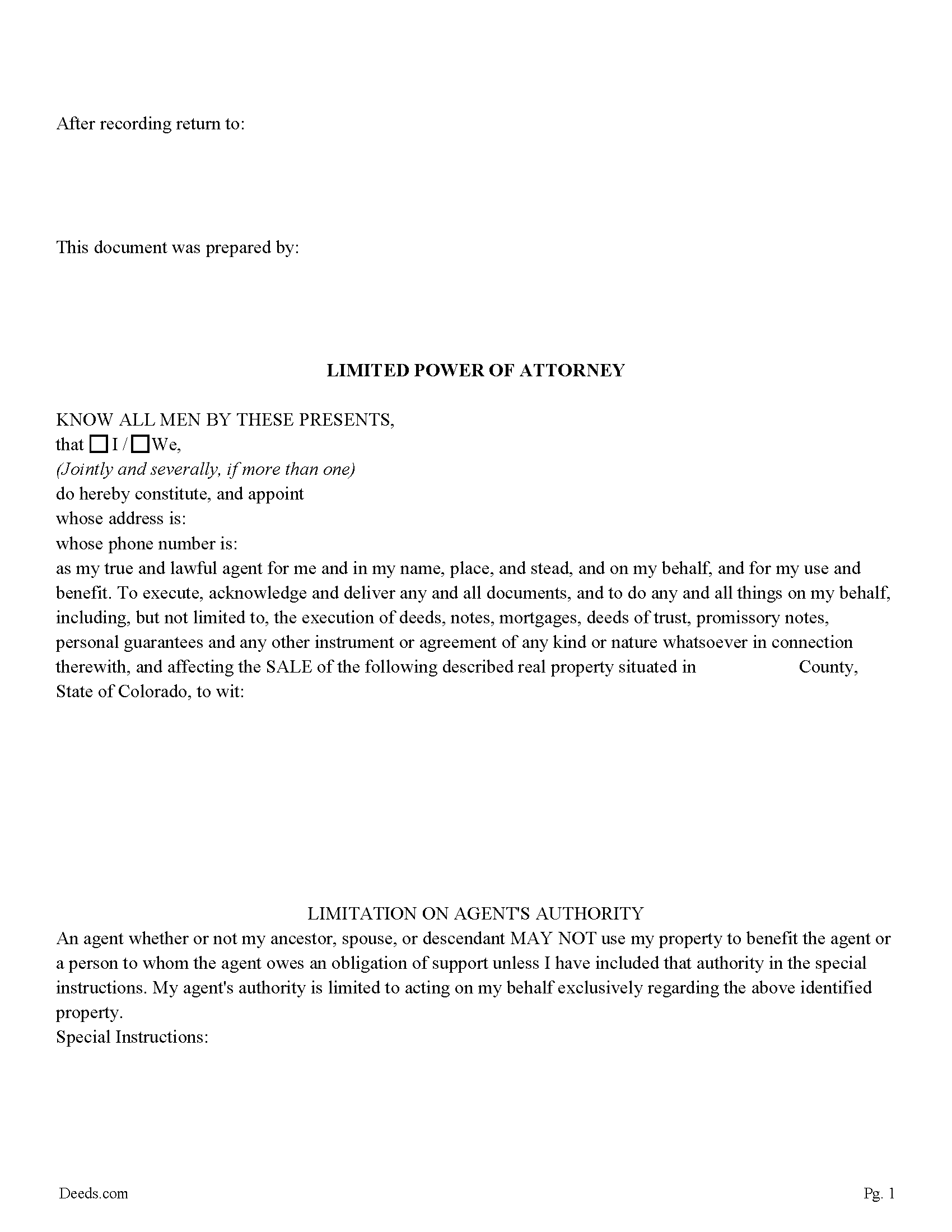
This document creates a durable, limited power of attorney for the sale of Colorado real estate. A power of attorney is a legal document delegating authority from one person to another. In the document, the maker of the power of attorney (the "principal") grants the right to act on the maker's behalf as that person's Attorney-in-fact.
Attorney-in-fact means a person granted authority to act for the principal in a power of attorney, regardless of whether the person is known as an attorney-in-fact or agent, or by some other term.
This limited power of attorney grants your agent the power to execute, acknowledge and deliver any and all documents, and to do any and all things on behalf of the principal, including, but not limited to, the execution of deeds, notes, mortgages, deeds of trusts, personal guarantees and any other instrument or agreement of any kind or nature whatsoever in connection therewith, and affecting the SALE of a specific real property. It includes a "special instructions" section which can be used to further limit or define the powers given.
An agent whether or not your ancestor, spouse, or descendant MAY NOT use your property to benefit the agent or a pe... More Information about the Colorado Limited Power of Attorney for the Sale of Real Property
Limited Power of Attorney for the Purchase of Real Property
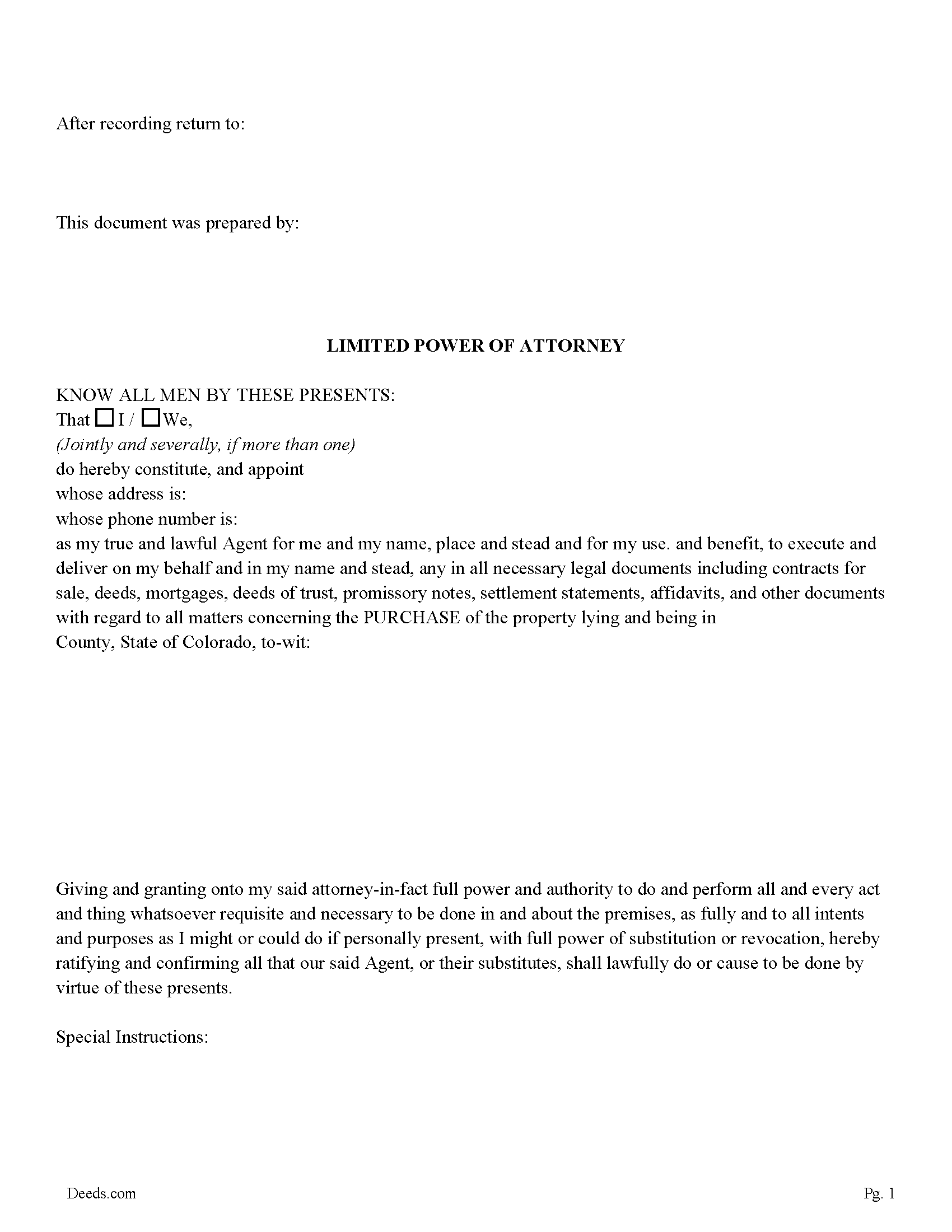
This document creates a durable, limited power of attorney for the PURCHASE of real property, located in Colorado. A power of attorney is a legal document delegating authority from one person to another. In the document, the maker of the power of attorney (the "principal") grants the right to act on the maker's behalf as that person's Attorney-in-fact/Agent.
Attorney-in-fact means a person granted authority to act for the principal in a power of attorney, regardless of whether the person is known as an attorney-in-fact or agent.
This special power of attorney grants the agent the power to execute and deliver on the principal's behalf, name and stead, any in all necessary legal documents including contracts for sale, deeds, mortgages, deeds of trusts, promissory notes, settlement statements, affidavits, and other documents with regard to all matters concerning the PURCHASE of a specific Colorado property. It includes a "special instructions" section which can be used to further limit or define the powers given.
(Colorado Limited POA-Purchase Package includes form, guidelines, and completed example)
... More Information about the Colorado Limited Power of Attorney for the Purchase of Real Property
Statutory Durable Power of Attorney
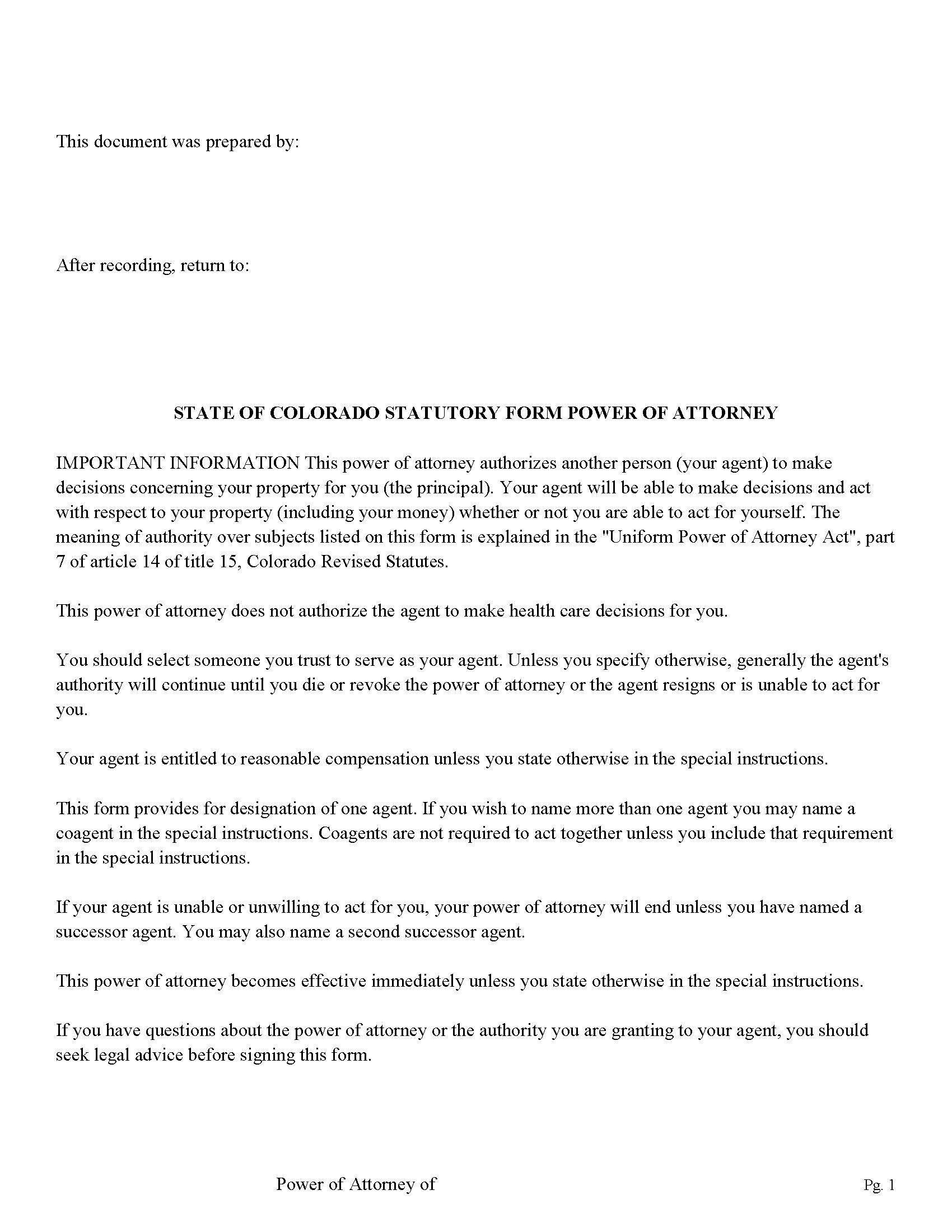
This is a statutory power of attorney formatted to the Colorado Uniform Power of Attorney Act.
Appoint an agent, co-agent and or successor agents. "Agent" means a person granted authority to act for a principal under a power of attorney, whether denominated an agent, attorney-in-fact, or otherwise. The term includes an original agent, coagent, successor agent, and a person to which an agent's authority is delegated. (15-14-702(1))
(A principal may designate two or more persons to act as coagents. Unless the power of attorney otherwise provides, each coagent may exercise its authority independently.)
(15-14-711. (1))
[A principal may designate one or more successor agents to act if an agent resigns, dies, becomes incapacitated, is not qualified to serve, or declines to serve. A principal may grant authority to designate one or more successor agents to an agent or other person designated by name, office, or function. Unless the power of attorney otherwise provides, a successor agent.] [15-14-711. (2)]
15-14-704. Power of attorney is durable
(1) A power of attorney created on and after January 1, 2010, is durable unless it expressly provides that it is terminated by the i... More Information about the Colorado Statutory Durable Power of Attorney
Beneficiary Deed
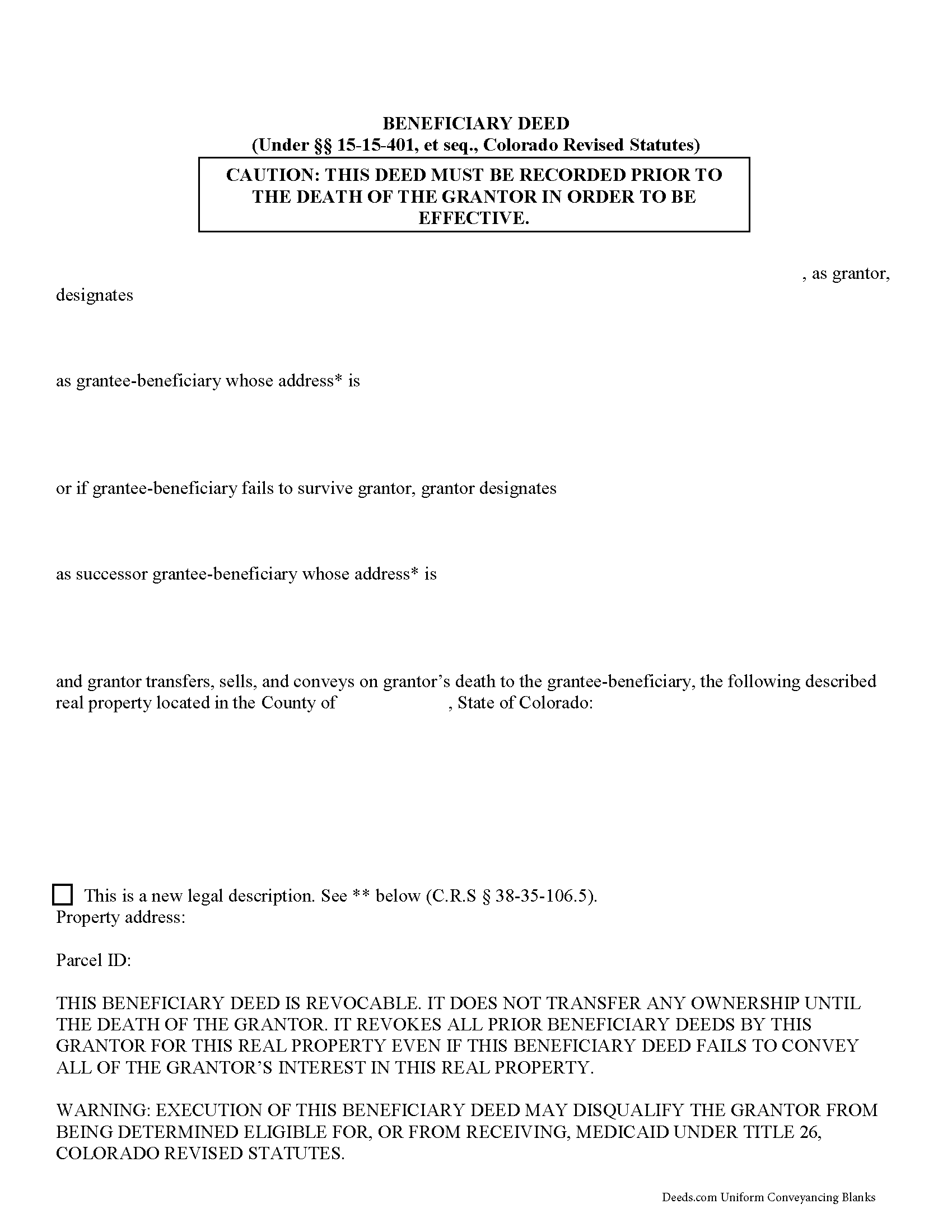
Beneficiary deeds in Colorado are governed by C.R.S. 15-15-401, et seq. (2012).
Under this statute, which was signed into law in 2004, a beneficiary deed is defined as "a deed, subject to revocation by the owner, which conveys an interest in real property and which contains language that the conveyance is to be effective upon the death of the owner and which may be in substantially the form described in section 15-15-404" (15-15-401(1)). To expand on this rather bare-bones definition, beneficiary deeds are useful estate planning tools that allow an individual who owns real estate in Colorado to pass that property to one or more designated grantee beneficiaries, but only after the owner's death. Note that this is a non-testamentary transfer, however, which means it is not included in a will, nor can it be cancelled by one (15-15-404(1), 15-15-405(4)). In addition, the conveyance is finalized without need for probate supervision.
The aspect of beneficiary deeds that makes them unique (and differentiates them from an ordinary life estate or joint tenancy deed) is the fact that the owner retains absolute ownership of and control over the property during his/her lifetime, and ma... More Information about the Colorado Beneficiary Deed
Beneficiary Deed Revocation
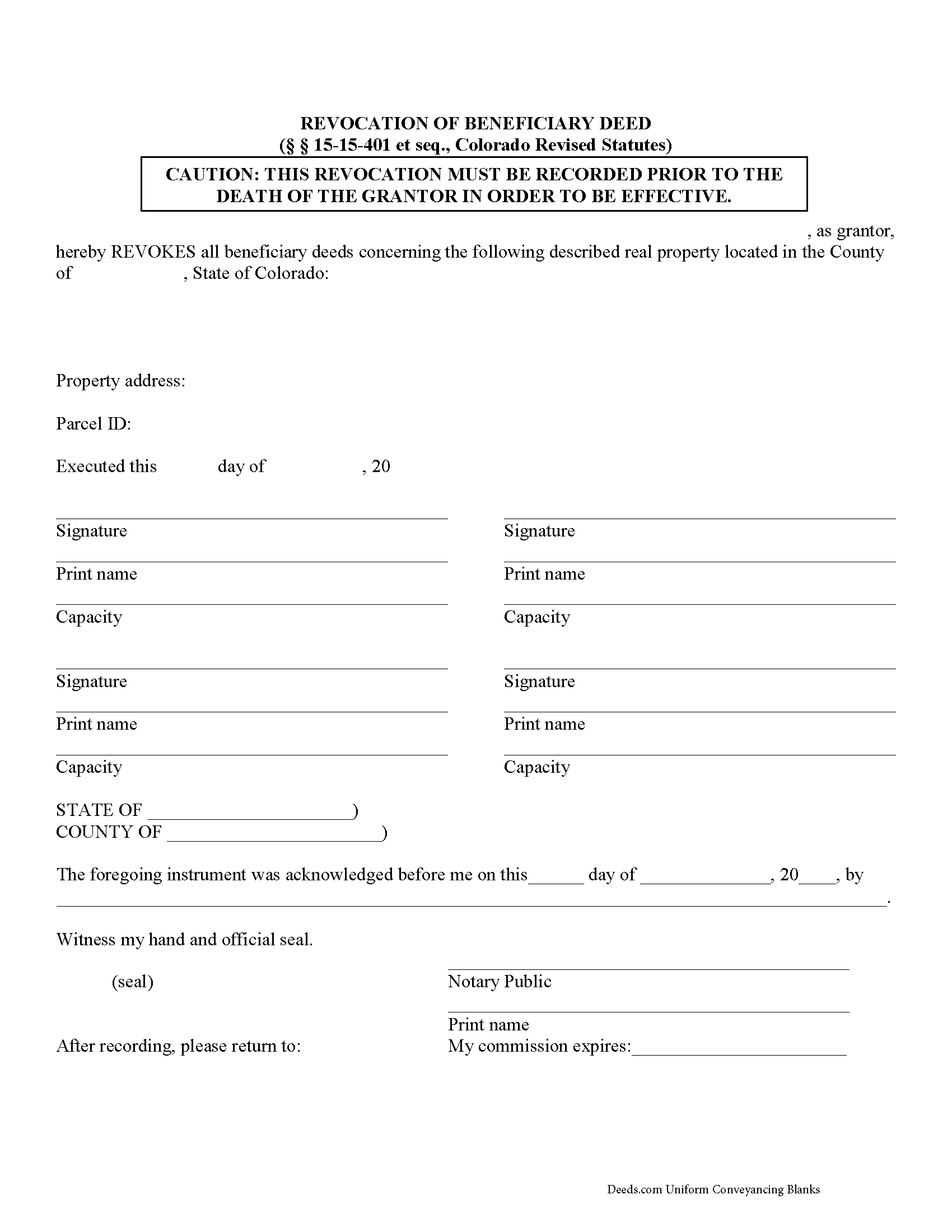
Colorado's beneficiary deeds are governed by C.R.S. 15-15-401 et seq. Revocations are specifically discussed in 15-15-405, which also defines the requirements for a basic form.
Revocability is one of the many useful features of a Colorado beneficiary deed. There are two primary ways for a land owner to revoke a recorded beneficiary designation: executing and recording a revocation, or executing and recording a new beneficiary deed that changes the original designation or distribution (15-15-405(1), (2)).
Neither a modification nor a revocation requires notifying beneficiaries because they only have a potential future interest in the property; nothing is promised or owed to them until the grantor's death. Note, however, that Colorado beneficiary deeds may NOT be revoked or changed by any provisions of the owner's will (15-15-405(4)).
Valid revocations identify the grantor, the property, make reference to the recorded beneficiary deed, and include any other information necessary for the specific situation. The form must also meet state and local standards for recorded documents.
A revocation, when correctly completed and filed for record with the appropriate local agenc... More Information about the Colorado Beneficiary Deed Revocation
Affidavit of Deceased Grantor
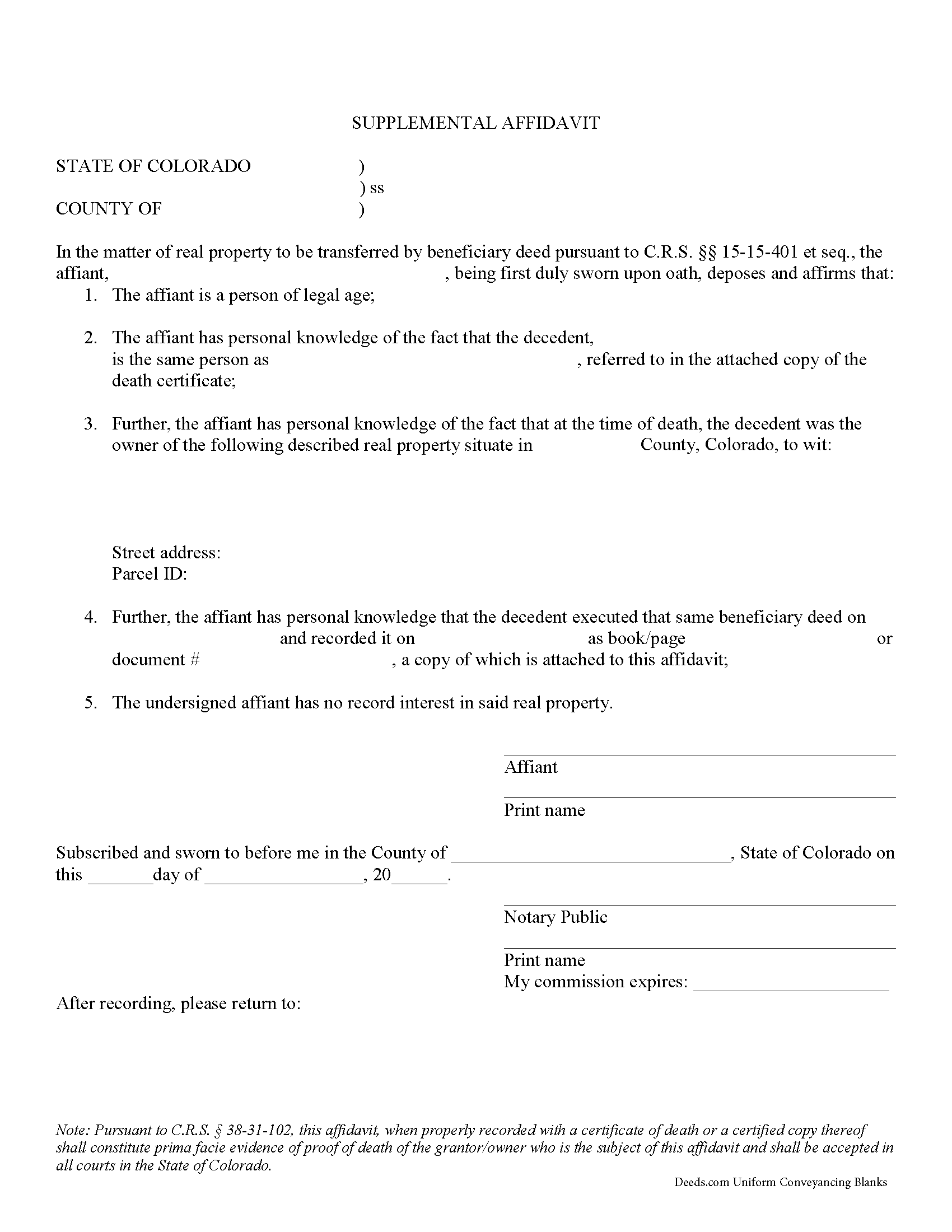
Use a Colorado supplemental affidavit of deceased grantor owner to complete the transfer of real property initiated by recording a Colorado beneficiary deed.
Completing the Transfer from a Colorado Beneficiary Deed
Beneficiary deeds provide a relatively straightforward, effective way for Colorado land owners to convey real estate, after death, to one or more named beneficiaries without the need for probate. See C.R.S. 15-15-401 et seq.
State law provides that title "to the interest in real property transferred by a beneficiary deed shall vest in the designated grantee-beneficiary only on the death of the owner" (15-15-407(1)). The beneficiary should offer proof "of the death of the owner or a grantee-beneficiary... in the same manner as for proving the death of a joint tenant" (15-15-413). That process is specified in 38-31-102, and it involves completing and filing a supplemental affidavit, along with a copy of the decedent's death certificate, with the recorder or register of deeds for the county where the land is located. While not specifically required, it is also a good idea to include a copy of the recorded beneficiary deed.
By recording the supplemental affida... More Information about the Colorado Affidavit of Deceased Grantor
Affidavit of Deceased Joint Tenant
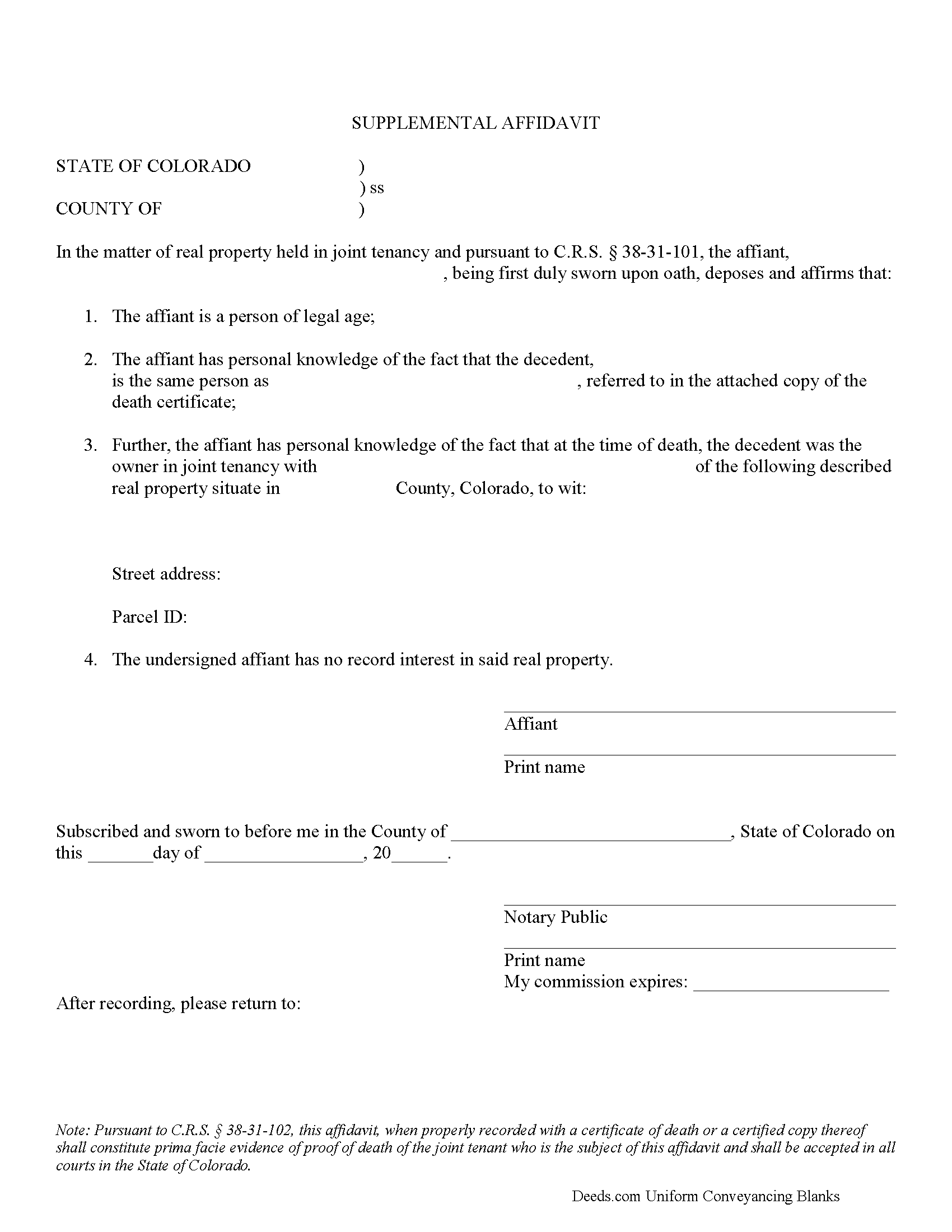
Use a Colorado supplemental affidavit of deceased joint tenant to provide formal notice that a named joint owner of real property has died.
Removing a Deceased Joint Tenant from a Colorado Real Estate Deed
Colorado law allows two or more people to co-own real property as either tenants in common or joint tenants.
Tenants in common hold individual, but not necessarily equal, shares of the title to real property, which they may sell without consulting the other co-owners. If a tenant in common dies, that portion of the property reverts to his/her estate, with no effect on the shares of the other owners.
Joint tenants, on the other hand, share undivided ownership of the whole property. The primary purpose of joint tenancy relates to the right of survivorship, which states that land titled this way is distributed equally amongst the surviving co-owners when one of them dies. See C.R.S. 38-31-101 for further details about co-ownership of real property.
Even though the shares technically pass to the survivors as a function of law when the deceased co-owner dies, it is necessary to formalize the change. Accomplish this by completing and recording a supplemental affidavi... More Information about the Colorado Affidavit of Deceased Joint Tenant
Disclaimer of Interest
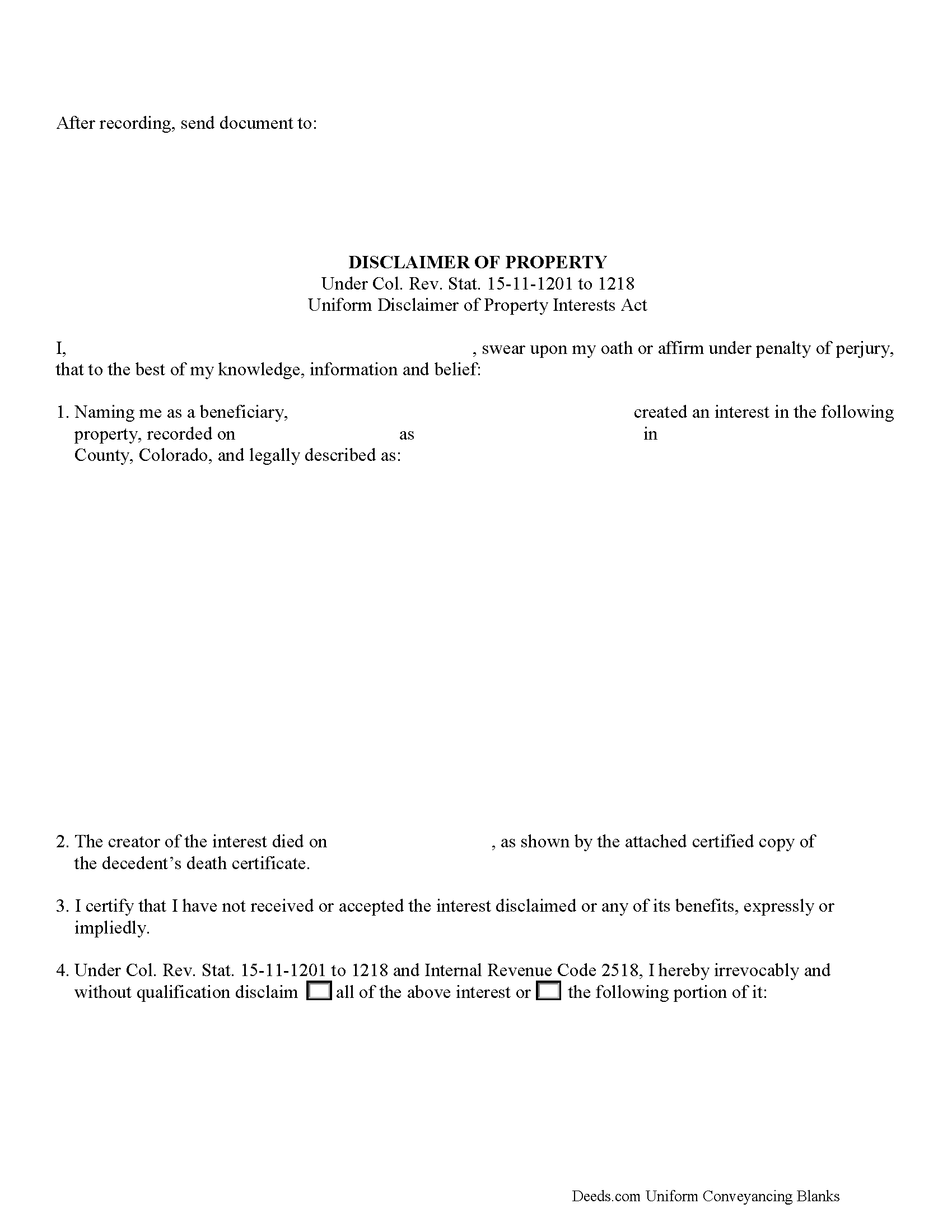
Under the Colorado statutes, the beneficiary of an interest in property may renounce the gift, either in part or in full (Uniform Disclaimer of Property Interests Act, Col. Rev. Stat. 15-11-1201 to 1218). Note that the option to disclaim is only available to beneficiaries who have not acted in any way to indicate acceptance or ownership of the interest (Col. Rev. Stat. 15-11-1213)
The disclaimer must be in writing and include a description of the interest, a declaration of intent to disclaim all or a defined portion of the interest, and be signed by the disclaimant (Col. Rev. Stat. 15-11-1205 (3)).
Deliver the disclaimer within nine months of the transfer (e.g., the death of the creator of the interest) to the personal representative of the decedent's estate, or file it with the court who has jurisdiction to appoint such a person (Col. Rev. Stat. 15-11-1212 (3)). In the case of real property, record a copy of the disclaimer in the office of the clerk and recorder of the county in which the real estate is located (Col. Rev. Stat. 15-11-1212 (15)).
A disclaimer is irrevocable and binding for the disclaiming party and his or her creditors, so be sure to consult an attorne... More Information about the Colorado Disclaimer of Interest
Personal Representative Deed of Distribution
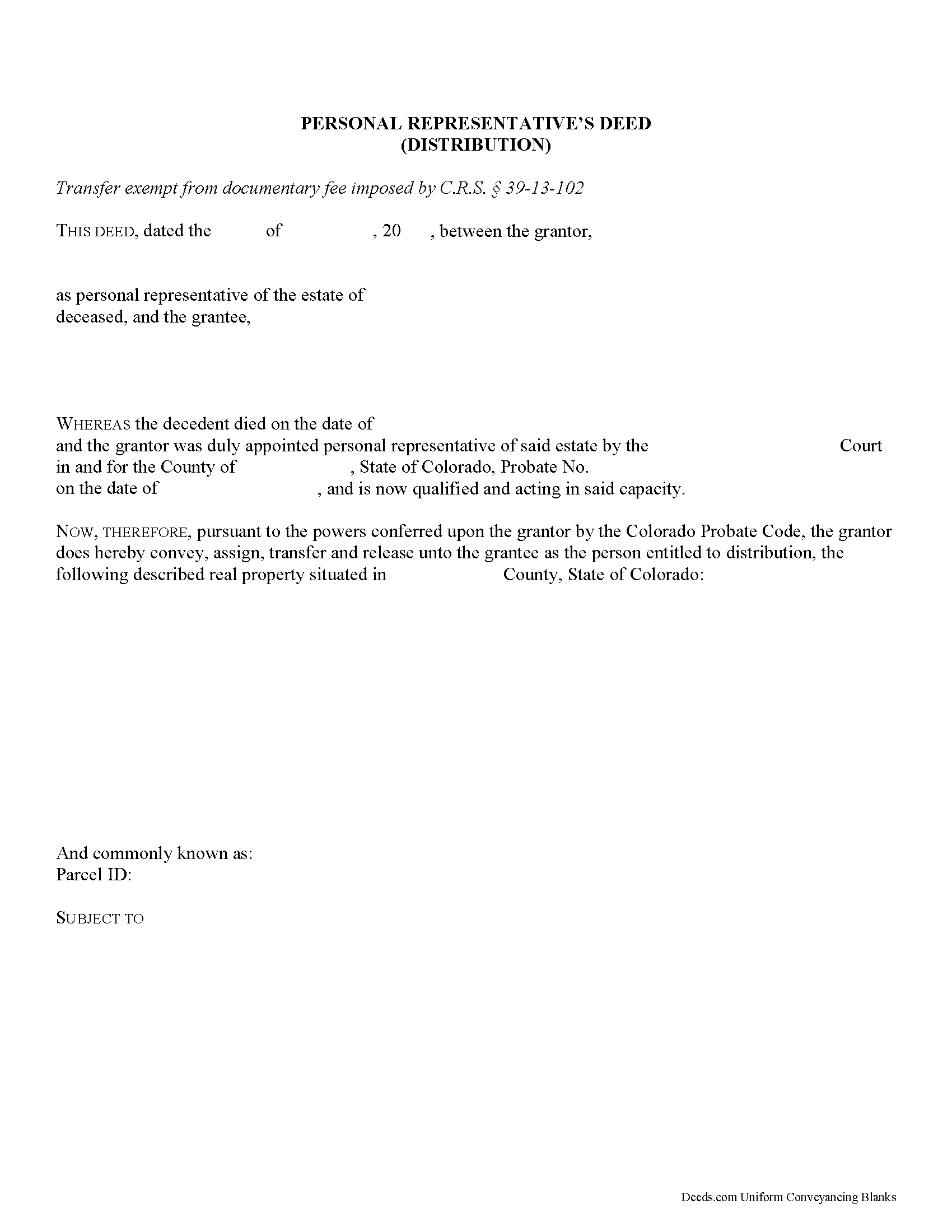
In Colorado, the person approved or appointed by the probate court to administer a decedent's estate is called a personal representative. The personal representative has a fiduciary duty to settle the decedent's estate, including devising real property to rightful heirs or distributing real property pursuant to the laws of intestate succession set forth in the Colorado Probate Code.
Use the personal representative's deed of distribution to transfer real property to a devisee (someone designated in a will to receive the decedent's property) or an heir (a person, including the surviving spouse, entitled under statutes of intestate succession to receive the decedent's property).
The personal representative's deed does not warrant against title defects preceding the appointment of the personal representative.
Additional documents, including letters of administration or letters testamentary, may be required. Consult an attorney with questions regarding the probate process and personal representative's deeds in Colorado.
(Colorado Personal Representative Deed Package includes form, guidelines, and completed example)... More Information about the Colorado Personal Representative Deed of Distribution
Personal Representative Deed of Sale
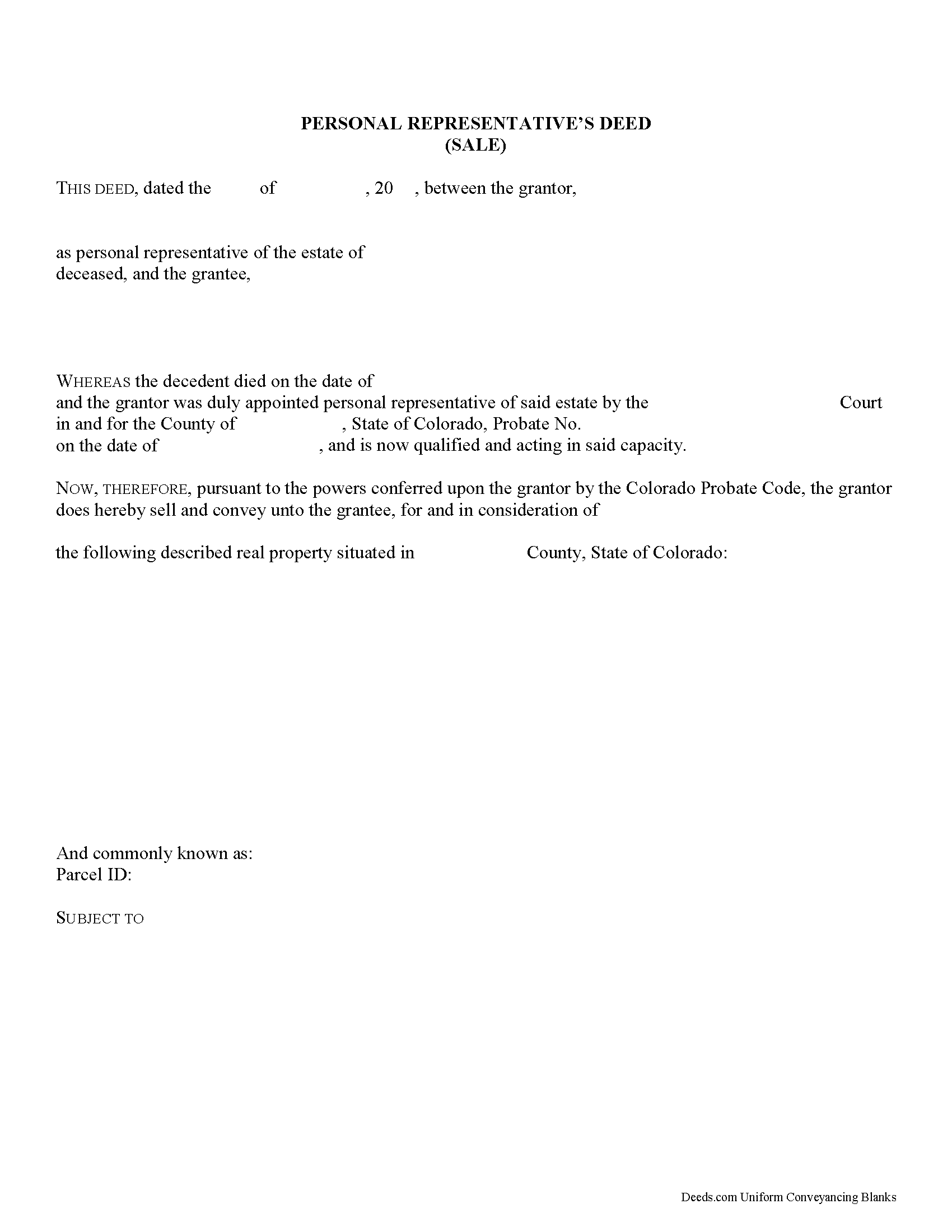
In Colorado, the person approved or appointed by the probate court to administer a decedent's estate is called a personal representative. The personal representative has a fiduciary duty to settle the decedent's estate.
Through a power of sale granted in a will, a specific direction in a will to sell real property, or a court order, the personal representative may dispose of the decedent's real property through statutory sale. Use the personal representative's deed of sale to convey real property to a purchaser.
The personal representative's deed does not warrant against title defects preceding the appointment of the personal representative.
Additional documents, including letters of administration or letters testamentary, may be required. Consult an attorney with questions regarding the probate process and personal representative's deeds in Colorado.
(Colorado Personal Representative Deed of Sale package includes form, guidelines, and completed example)... More Information about the Colorado Personal Representative Deed of Sale
Trustee Deed

A trustee's deed is a form of conveyance used in trust administration and named for the person executing the deed. A trustee, as the grantor, uses the deed to convey real property out of a trust and vest title in the name of the grantee.
Note: A trustee's deed is separate from a public trustee's deed, which is a form of conveyance used by a county-appointed public trustee to transfer foreclosed property under a deed of trust containing a power of sale.
Generally, a Colorado trustee's deed is a bargain and sale deed. A bargain and sale deed conveys all interest in real property a grantor has without warranties of title, and recites consideration, which is the entire monetary compensation the grantee has paid for the transfer. Some trustee's deeds contain special warranties, however. A special warranty deed warrants the title only for the duration of the grantor's ownership of the property, and may contain further limitations.
In order for a trustee to convey trust property pursuant to C.R.S. 38-30-108.5, a statement of authority must be on record certifying the trustee's authority to act on behalf of the trust.
The trustee's deed follows the format established under C.R... More Information about the Colorado Trustee Deed
Preliminary Notice of Mechanics Lien
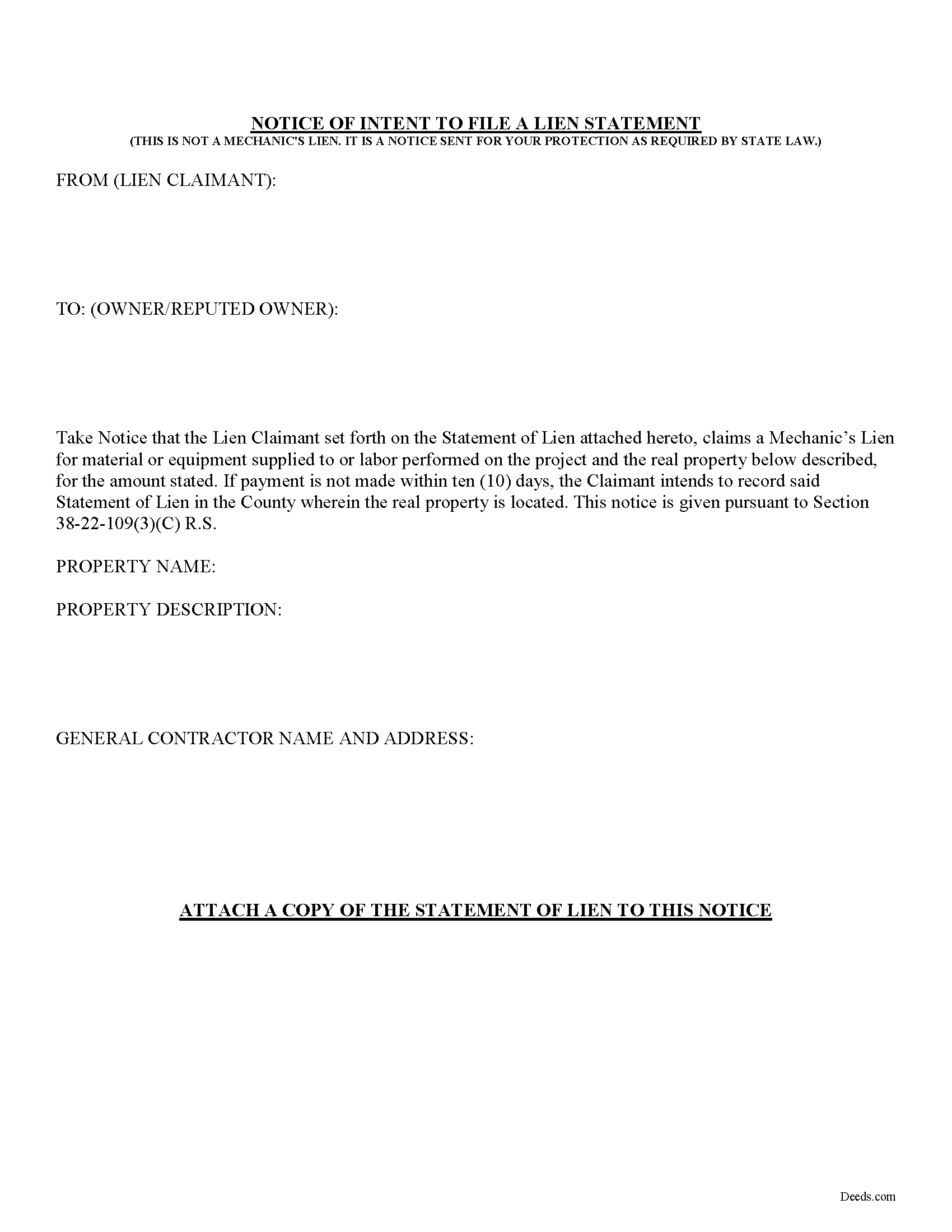
In Colorado, claimants must serve a property owner with preliminary (a.k.a. "prelien") notice before claiming a mechanic's lien. This is required as a means of protection for the owner by warning the property owner, prime contractor, or any other party that a mechanics lien will be filed unless payment of past due amounts is made.
To preserve lien rights for work performed or laborers or materials furnished, there must be a notice of intent to file a lien statement served upon the owner (or reputed owner) of the property or the owner's agent and the principal or prime contractor or his or her agent at least ten days before the time of filing the lien statement with the county clerk and recorder. C.R.S. 38-22-109(3). The notice of intent must be served through personal service or by registered or certified mail, with a return receipt requested, and addressed to the last known address of such persons. Id. An affidavit of service or mailing must also be filed for record with the lien statement and will constitute proof of such service. Id.
The notice form contains the following information: (1) the lien claimant's name and address; (2) the property owner's name and address; (3) ... More Information about the Colorado Preliminary Notice of Mechanics Lien
Statement of Mechanics Lien
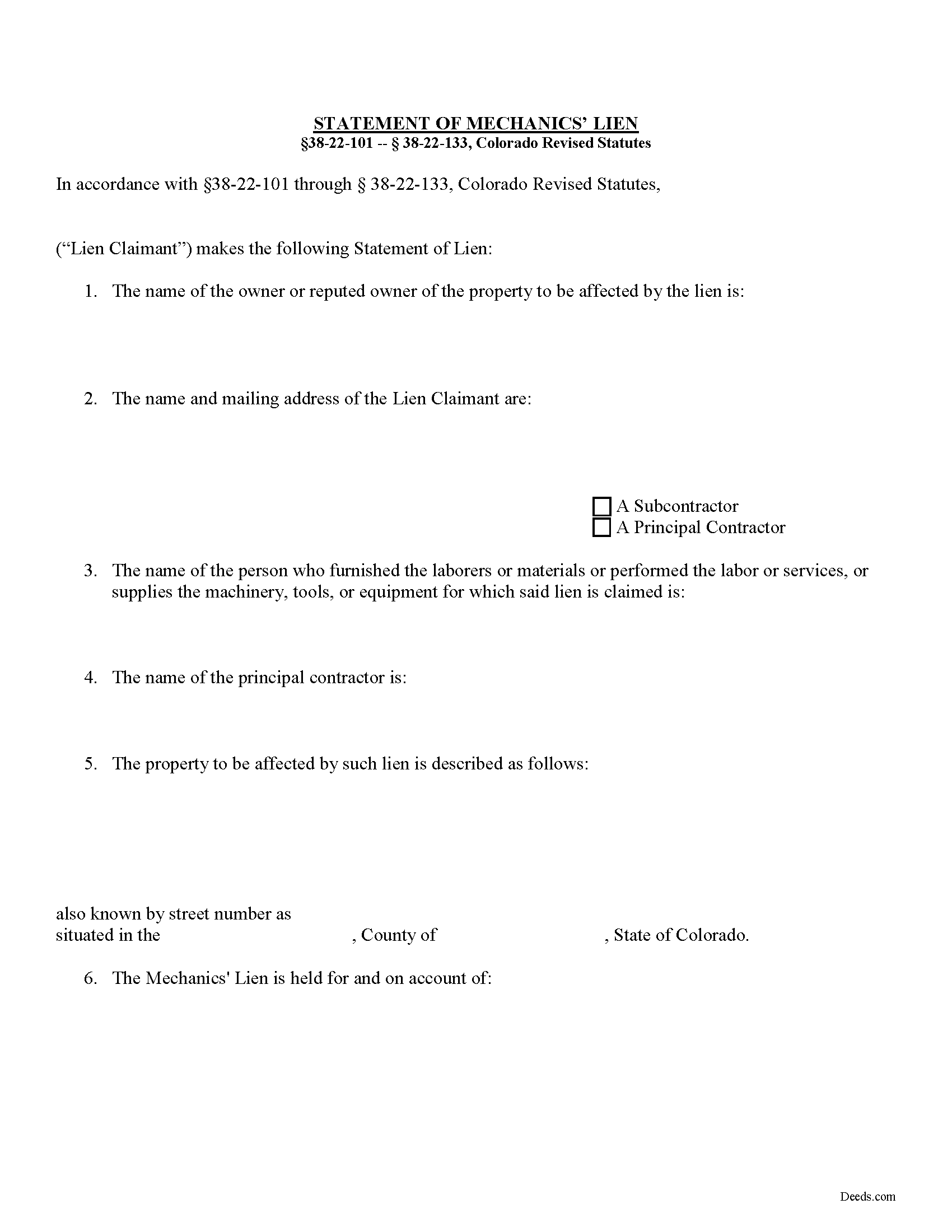
Statement of Lien in Colorado
Contractors and subcontractors have a unique remedy available to them when a property owner or some other party involved in the "chain" refuses to pay up. This special remedy is called a mechanic's lien, also sometimes known as a contractors, materialman, or construction lien. The lien works like a mortgage by giving a type of property interest to the lien holder. With a lien in place, it becomes more difficult for the owner to sell or refinance a property. Other contractors will also see there is already a lien before they begin any additional work. In Colorado, mechanic's liens are governed under 38-22-101 -- 38-22-133 of the Colorado Revised Statutes (C.R.S.). In Colorado, claimants must file a Statement of Lien document to claim a mechanic's lien.
The Statement of Lien must contain the following: (1) The name of the owner or reputed owner of such property, or in case such name is not known to him, a statement to that effect; (2) the name of the person claiming the lien; (3) the name of the person who furnished the laborers or materials or performed the labor for which the lien is claimed; (4) the name of the contractor when the lien is claim... More Information about the Colorado Statement of Mechanics Lien
Mechanics Lien Release
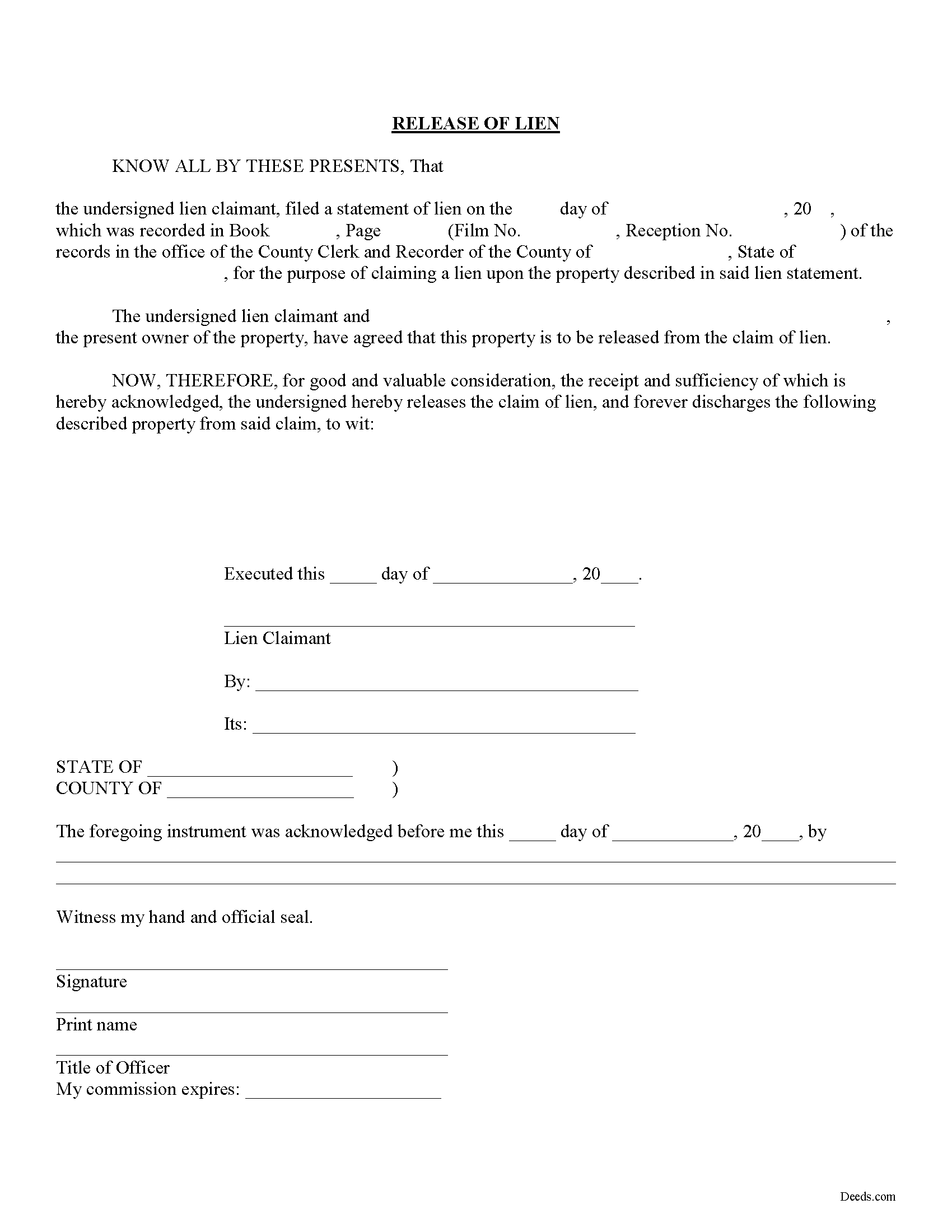
Releasing a Lien in Colorado
Colorado law doesn't provide for any mandated documents to release a lien, so how can a claimant (someone who filed a claim for lien against a property owner) accomplish this? When a lien has been satisfied, or needs to be released for any other purpose, use a lien release form.
The lien release form contains information about the lien claimant, the underlying mechanic's lien, and the property charged with the lien. By recording the document, the clerk at the recorder's office can locate the original lien and mark it as "discharged."
Find Colorado's General Mechanic's Lien laws at C.R.S. 38-22.
This article is provided for informational purposes only and should not be relied upon as a substitute for the advice of an attorney. If you have specific questions about releasing a lien, please speak with a Colorado attorney.... More Information about the Colorado Mechanics Lien Release
Conditional Lien Waiver
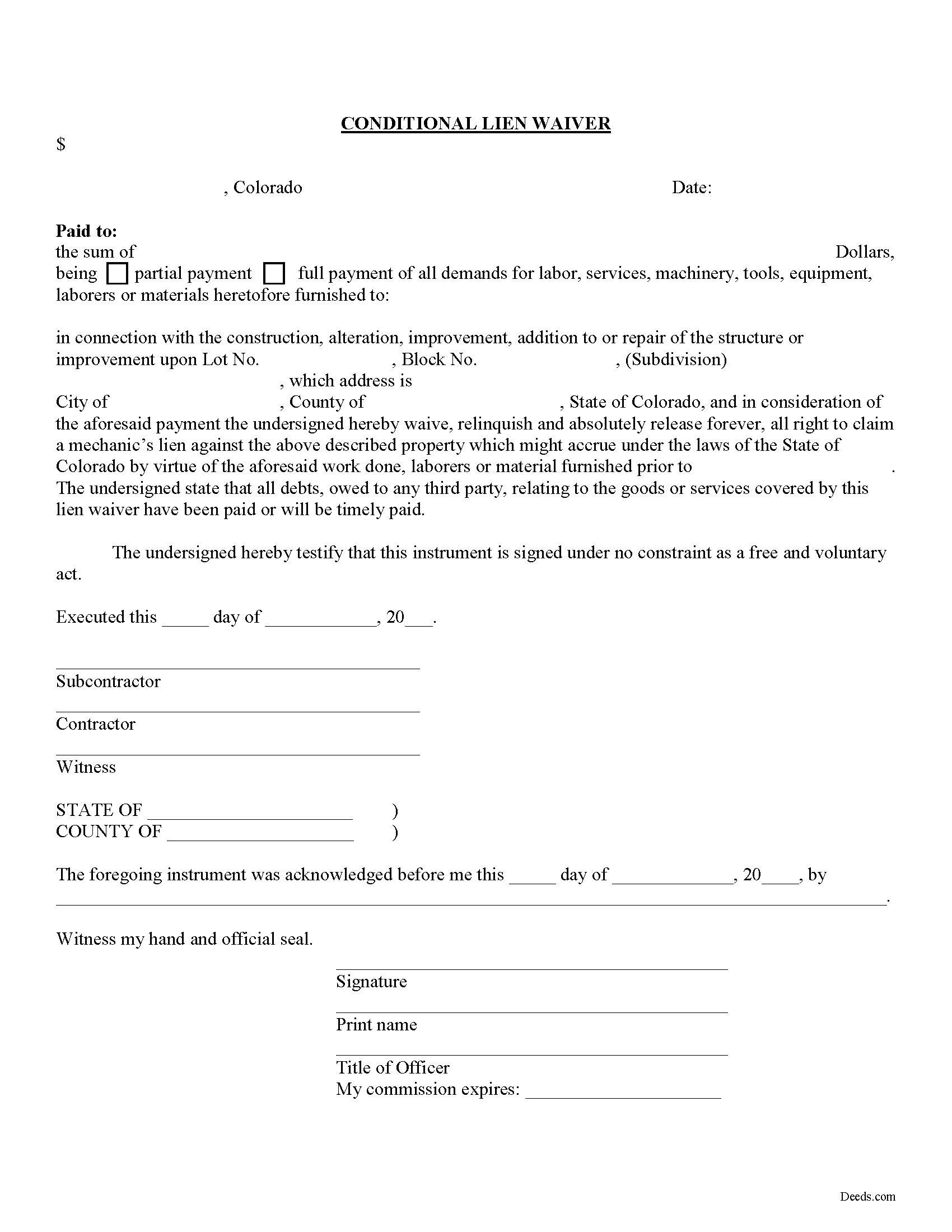
There are two types of lien waivers -- conditional and unconditional. A conditional waiver depends on a triggering event occurring, which activates the waiver clause. The event is usually the payment of the due amount or the clearing of an issued check. A conditional waiver offers more protection for the contractor or subcontractor and less for the owner.
The second type of waiver is an unconditional waiver and is effective upon its issue to waive a lien claim for all or part of the potential claim amount. This waiver offers the owner stronger protection and the contractor or subcontractor less assurance of payment. Therefore, it should only be granted when the contractor or sub is close to 100% certain that payment will clear.
So, use the conditional waiver when receiving a check or some other form of payment that might not clear the bank. It is also useful when the owner promises to pay by a specific date in the future, say next Wednesday, but wants a waiver regardless.
Find Colorado's General Mechanic's Lien laws at C.R.S. 38-22.
This article is provided for informational purposes only and should not be relied upon as a substitute for an attorney's advice. Please co... More Information about the Colorado Conditional Lien Waiver
Unconditional Lien Waiver
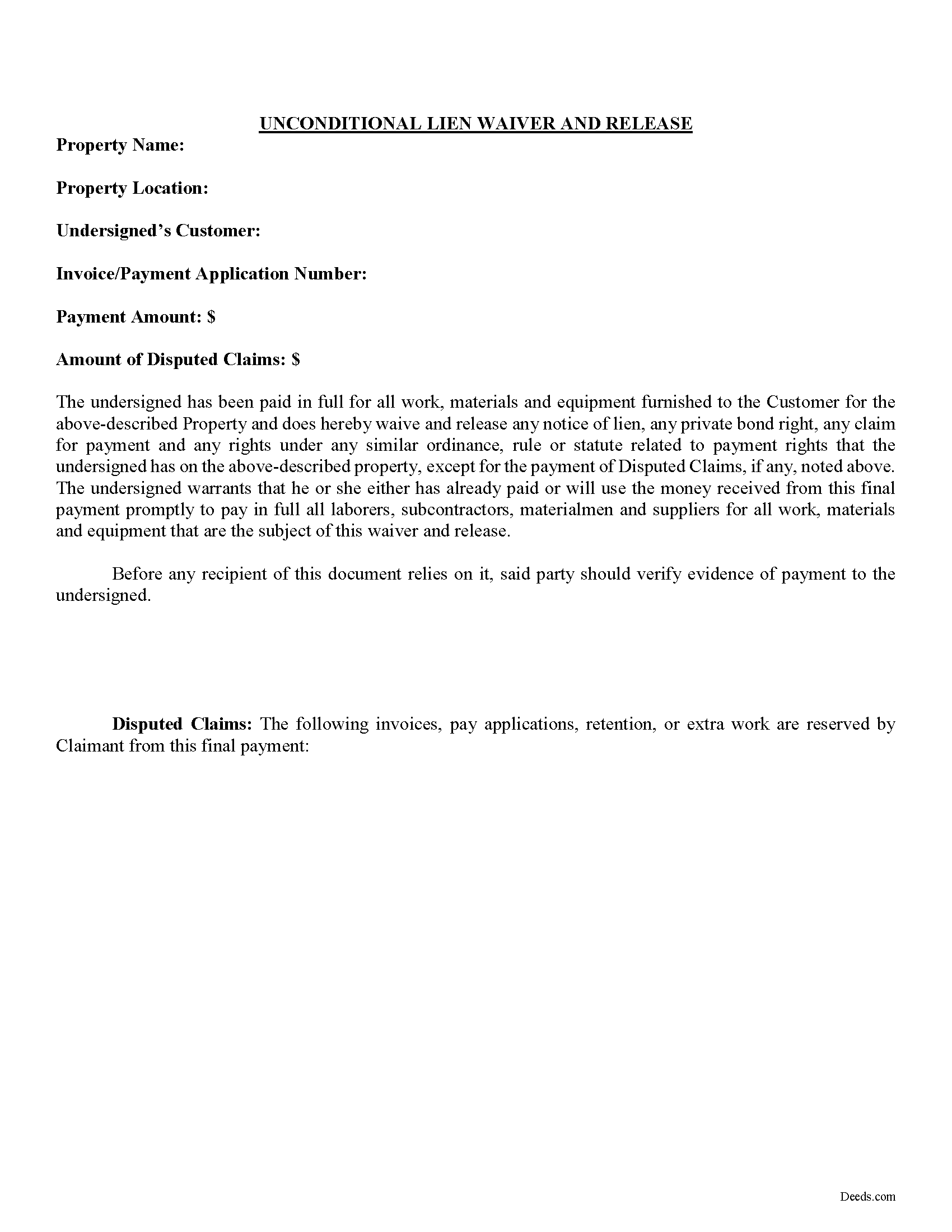
Find Colorado's General Mechanic's Lien laws at C.R.S. 38-22.
There are two types of lien waivers -- conditional and unconditional. A conditional waiver only becomes effective when a triggering event occurs, activating the waiver clause. The event is usually the payment of the due amount or the clearing of an issued check. A conditional waiver offers more protection for the contractor or subcontractor and less for the owner.
The second type of waiver is an unconditional waiver and is effective upon its issue to waive a lien claim for all or part of the potential claim amount. This waiver offers the owner stronger protection and the contractor or subcontractor less assurance of payment. Therefore, it should only be granted when the contractor or sub is close to 100% certain that payment will clear.
Be aware that if a lien claimant grants an unconditional waiver and the payment never arrives or the check bounces, he or she is out of luck for a mechanic's lien claim. There is still an option of recovery by filing a lawsuit based on a breach of contract, but such a suit could be lengthy, costly, and without any guarantee of a recovery in the end.
So, use the unconditiona... More Information about the Colorado Unconditional Lien Waiver
Lis Pendens
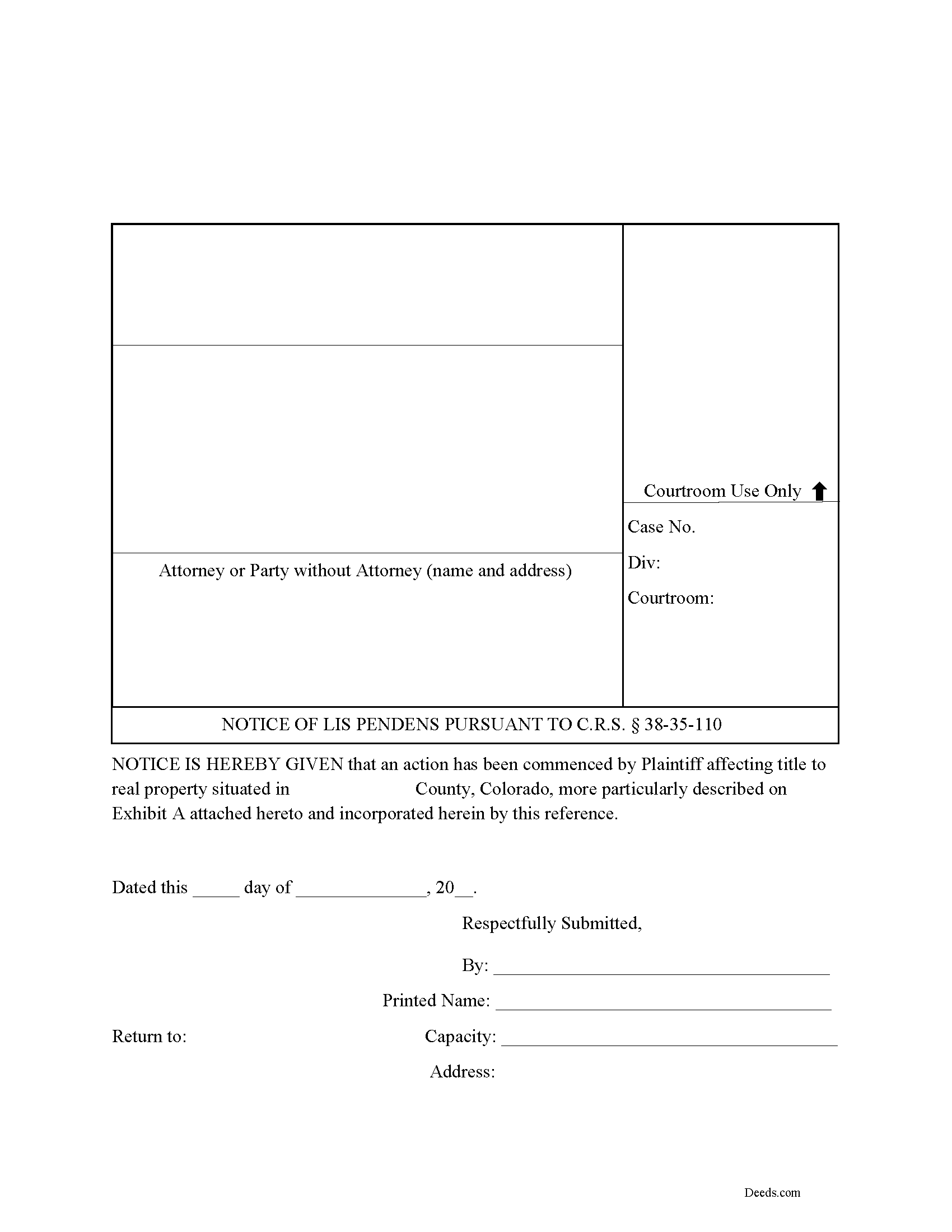
In Colorado a Lis Pendens should only be filed after a lawsuit affecting title to real property has been initiated. The Lis Pendens gives constructive notice to the world that litigation is pending and if you buy the property you are subject to the outcome of said litigation. This in effect puts a cloud on the title and discourages any transactions of said property. In general, the law that governs Colorado Lis Pendens is CO Rev Stat 38-35-110.
A Colorado Lis Pendens shall contain:
The name of the court where such action is pending
The names of the parties to such action at the time of such recording, and
A legal description of the real property.
A Colorado Lis Pendens should be recorded in the office of the county clerk and recorder in the county or counties in which the real property or any portion thereof is situated. Example: If a property spans two counties, record a Lis Pendens document in each county.
(Colorado Lis Pendens Package includes form, guidelines, and completed example) Formatted to meet Colorado recording requirements.
... More Information about the Colorado Lis Pendens
Lis Pendens Release
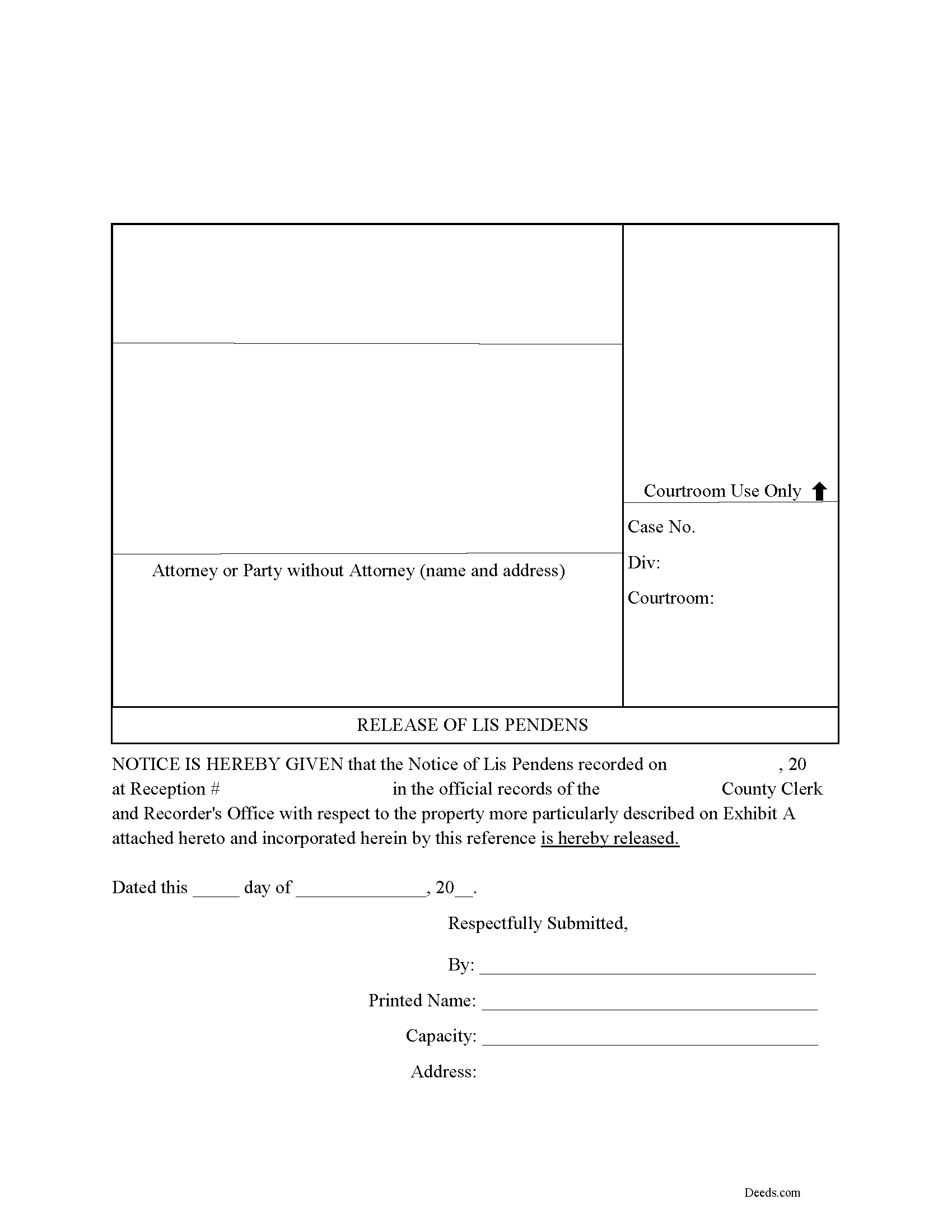
The plaintiff usually files a Lis Pendens, and sometimes thinks when a case is settled, or dropped, it is over. Except by certain Colorado Statutes the Lis Pendens remains active. This can get the plaintiff (person who initiated the suit) in legal jeopardy. If the seller or even potential buyer stop a transaction, because they saw a Lis Pendens, that should have been discharged, damages could be realized. This form is formatted specifically for releasing/discharging a Colorado Lis Pendens.
(Colorado Lis Pendens Release Package includes form, guidelines, and completed example)... More Information about the Colorado Lis Pendens Release
Certificate of Trust
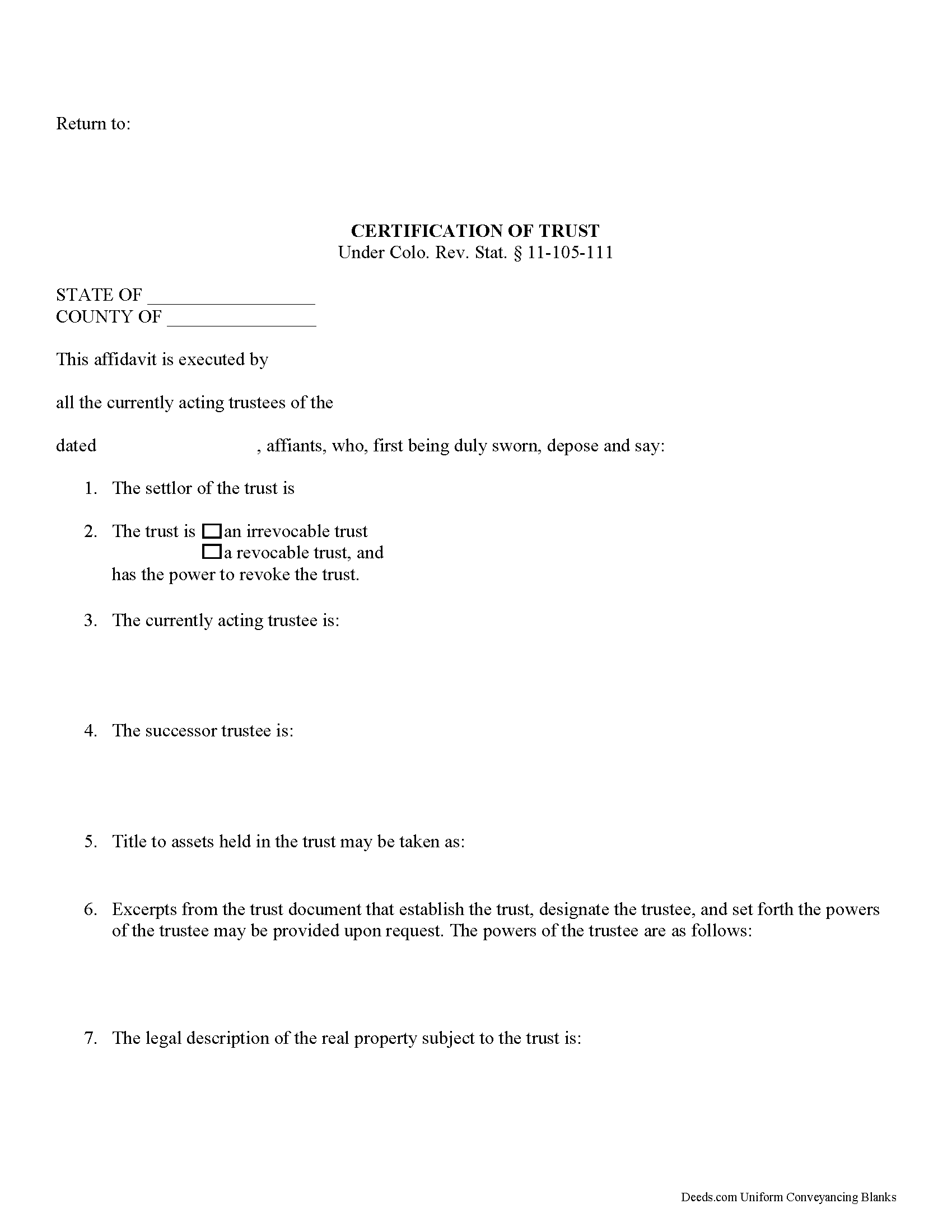
Certification of a Trust in Colorado
When a trustee wishes to conduct business with a bank in the name of a trust, he/she needs to prove his/her authority to do so by producing a certification of trust, governed by C.R.S. 11-105-111 (2017). The certification of trust stands as prima facie evidence of the facts presented within.
Similar to a statement of authority, which identifies a trust and its trustee, and is recorded alongside a conveyance of real property into a trust, the certificate of trust verifies the existence of a trust and a trustee's authority to act on behalf of the trust. However, the certificate of trust is not necessarily recorded, and it provides more information about the trust.
The certificate functions as "evidence of the trust relationship" by presenting essential information about the trust (C.R.S. 11-105-111(1)). It is a summary of the trust agreement conferring administrative powers to the trustee, and sometimes contains excerpts of the relevant information directly from the trust agreement. The certificate does not disclose nonessential provisions of the trust agreement, such as the identity of those having a beneficial interest in the trust, whi... More Information about the Colorado Certificate of Trust
Statement of Authority
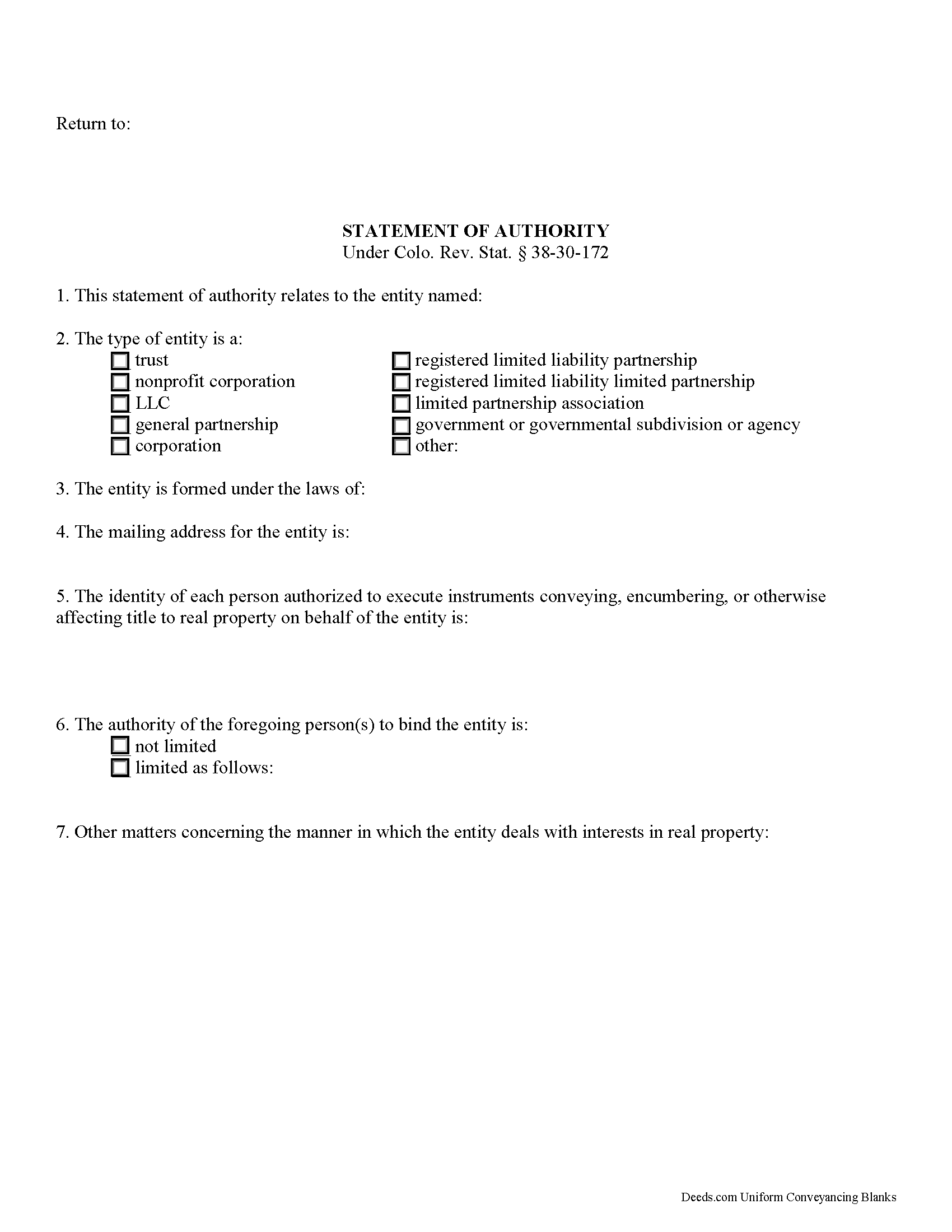
A statement of authority is used by a partnership, corporation, government agency, LLC, or other entity who is not an individual to evidence the entity's existence and the identity of the person(s) authorized to act on behalf of the entity [1]. The statement of authority in the State of Colorado is governed by Section 38-30-172 of the Revised Statutes (2016).
Under C.R.S. 38-30-108.5(1), "A trust may acquire, convey, encumber, lease, or otherwise deal with any interest in real ... property in the name of the trust." A statement of authority is recorded alongside a conveyance of interest in real property to a trust; it is executed by the person(s) authorized to hold the title on behalf of the trust -- in this case, the trustee(s).
In addition to listing the name and type of the entity (trust, in this case) and the identity of any persons authorized to execute instruments affecting title to real property on its behalf (trustee), the statement of authority specifies the state, country, or other governmental authority under whose laws it was formed (Colorado) [2]. The document also provides the mailing address of the entity so that the assessor knows where to send tax statements ... More Information about the Colorado Statement of Authority
Mineral Deed
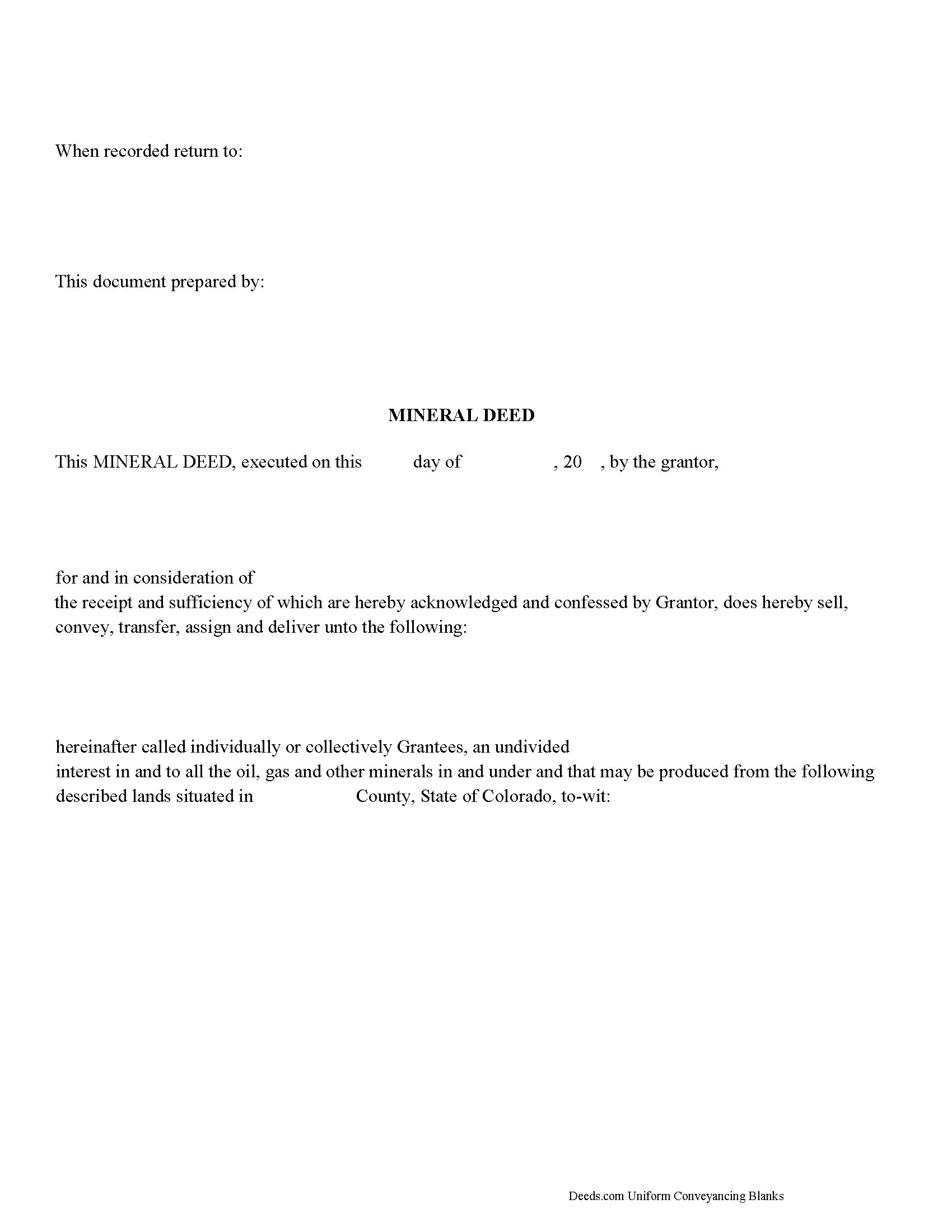
The General Mineral Deed in Colorado transfers oil, gas, and mineral rights from the grantor to the grantee. THIS IS NOT A LEASE. There are no Exceptions or Reservations included.
The transfer includes the oil, gas and other minerals of every kind and nature. It also transfers any and all rights to receive royalties, overriding royalties, net profits interests or other payments out of or with respect to those oil, gas and other minerals. The Grantor can stipulate the percentage of Mineral Rights the Grantee will receive and is made subject to any rights existing under any valid and subsisting oil and gas lease or leases of record.
This general mineral deed gives the grantee the right to access, for the purpose of mining, drilling, exploring, operating and developing said lands for oil, gas, and other minerals, and storing handling, transporting and marketing of such.
In this document the Grantor Warrants and will defend said Title to Grantee. Use of this document has a permanent effect on your rights to the property, if you are not completely sure of what you are executing seek the advice of a legal professional.
(Colorado Mineral Deed Package includes form, guidelines,... More Information about the Colorado Mineral Deed
Mineral Deed with Quitclaim Covenants
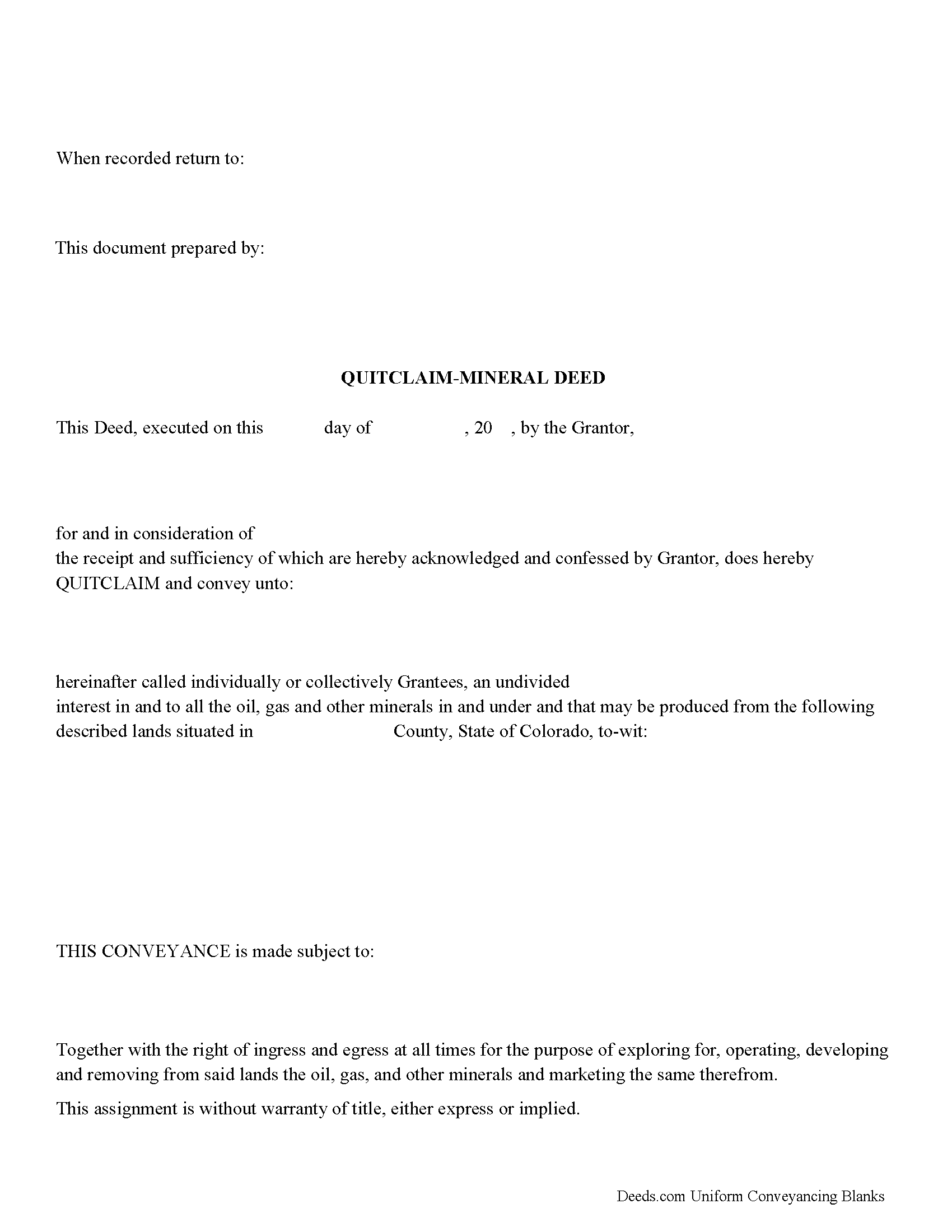
In Colorado, a Mineral Quitclaim Deed is used to transfer oil, gas, and mineral rights from the grantor to the grantee. It is a form of property transfer, not a lease agreement (CO Rev Stat § 38-30-113).
Transfer Details: The deed includes the transfer of a variety of mineral rights, such as oil, gas, and other minerals, without exceptions or reservations. The grantor specifies the percentage of mineral rights the grantee receives.
Rights and Access: The grantee is granted rights to access the land for activities like mining, drilling, exploration, operation, and development of these minerals, including their storage, handling, transportation, and marketing.
No Title Warranty: The grantor quitclaims the mineral rights without any warranty of title, either express or implied, meaning the grantee accepts the title as it is, including any discrepancies (§ 38-30-116).
Uses: Mineral deeds with quitclaim are often used in situations where the grantor wants to quickly release any interest they might have in mineral rights, such as in settling estates, resolving disputes, clearing up uncertainties about ownership in a title's history or when mineral rights have previously bee... More Information about the Colorado Mineral Deed with Quitclaim Covenants